- 606-889-173
- [email protected]
- Czech Republic

Present Perfect
For recently finished actions.

Table of Contents
In this grammar section we will have a look at the tense Present Perfect to talk about recently finished/completed actions.
A: How long have you worked there? B: I have worked there for 3 years.
A: How long have you been friends? B: We haven’t been friends for long. We have been friends since 2022
The video gives an overview of to Present Perfect for something recently completed/finished actions.
It shows the meaning/usage: when and why to use the Present Perfect.
For the form and the pronunciation have a look a the different webpages:
- Present perfect form
- Present perfect pronunciation
Usage/ Meaning
How and when do we use the Present Perfect?
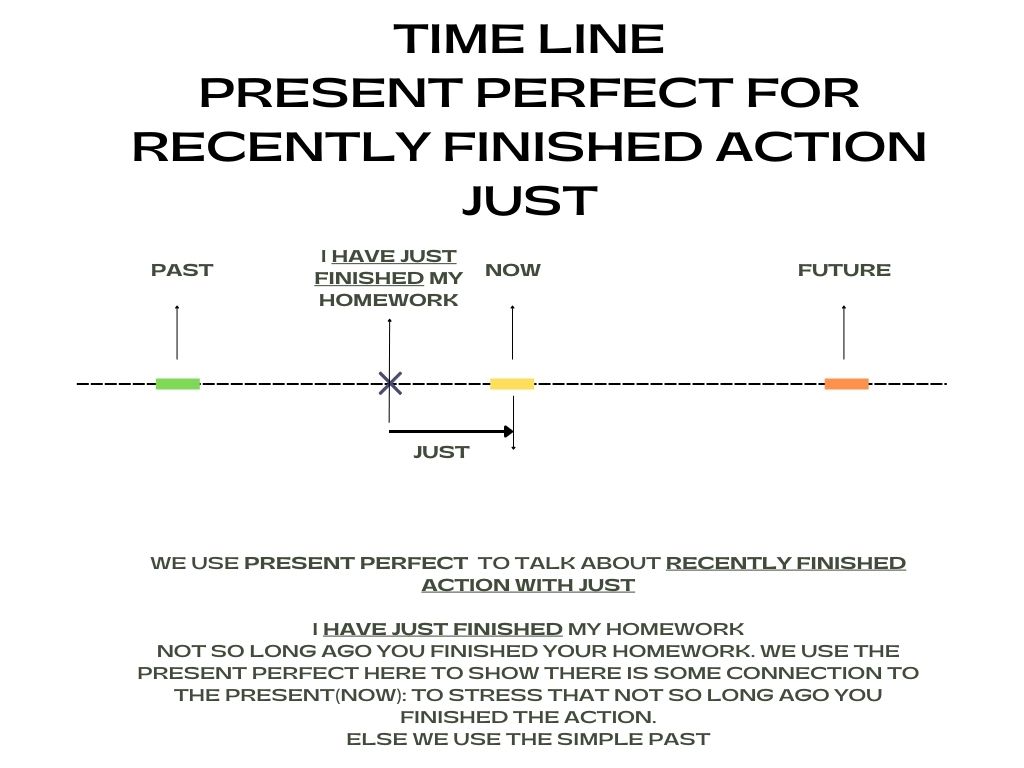
Present Perfect is also used to talk about something recently finished.
I have just done my homework: This means not so long ago you finished your homework . It is an unspecified time in the past . We don’t know when the person did it, but it wasn’t so long ago . It is usually used to stress that you finished the action and there it no need to do it anymore or no need to worry about it anymore .
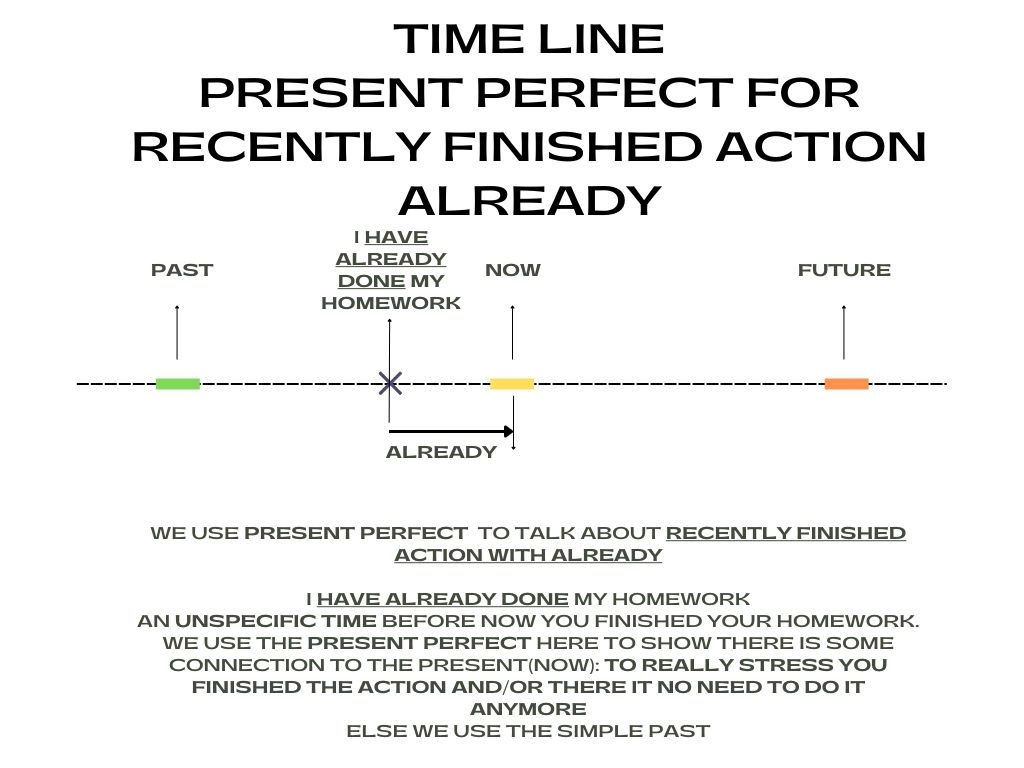
I have already done my homework: This means you finished your homework somewhere before now . It is an unspecified time in the past . We don’t know when the person did it . It is usually used to stress that you finished the action and there it no need to do it anymore or no need to worry about it anymore .
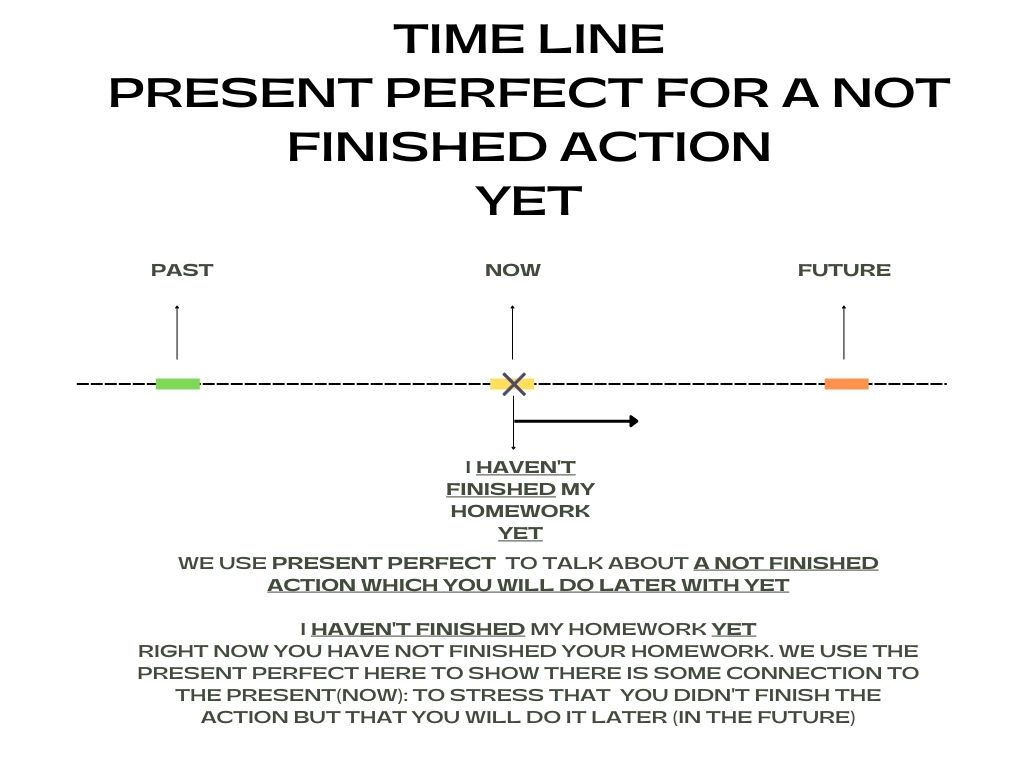
Present Perfect is also used to talk about something that is not finished.
I haven’t done my homework yet : This means you did not finished your homework somewhere before now but that you will do it later . It is usually used to stress that you did not finished the action but you will do it somewhere soon in the future.
- Just: recently finished actions. positive and questions. Between have and the main verb : I have just finished .
- Already: finished actions. positive and questions. Between have and the main verb : I have already finished .
- Yet: not finished, but will finish it later. Negative and questions. At the end of the sentence: I haven’t finished yet .

Have a look at the questions and write your answers in the comments below . Also give us some more details about when, where, why,….
- What have you already done today?
- What haven’t you done yet today, but must still do today?
- What have you just finished before answering these questions?
- Have you just had some food?
- Have you already finished your homework?
- Have you already studied today?
- Have you just had a phone call?
- Have you already had lunch today?
- Which movie have you already seen more than 2 times?
- Which goals in your life have you already achieved?
Spread the word
Kristof Abrath Teacher, Trainer, Course Designer Teaching in English on 4 different continents since 2006.
More tenses
English courses, additional services.

Grammar Bootcamp Tenses Level 2
€ 99,95
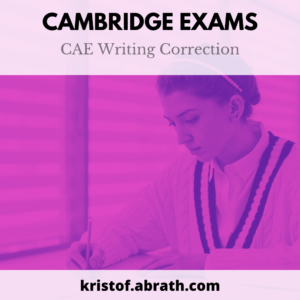
Cambridge Advanced CAE Full Writing correction
€ 24,99
Cambridge Advanced CAE Basic Writing correction
€ 14,99

Cambridge First FCE Full Writing correction
Cambridge first fce basic writing correction.

Phrasal Verb Course 1
€ 11,00
Comments or Questions?
Leave a reply cancel reply.
Your email address will not be published. Required fields are marked *
This site uses Akismet to reduce spam. Learn how your comment data is processed .
Kristof.abrath.com is registered under Kristof Abrath IČO: 07420609
- Job interview preparation
- Business English
- Business Communication
- Business Writing
- English Speaking
- English Writing
- English Grammar
- English Vocabulary
- Private English Course
- Teacher Training
- Teacher Training Workshops
- What we offer
Welcome Back
Login to your account.

How to use the 'Present Perfect'

'I have been to Boston.'
Have/has + past participle makes the present perfect .
She has lost her bag. They have taken a taxi I have been to Australia
The present perfect tense is used to describe something that happened in the past, but the exact time it happened is not important. It has a relationship with the present.
I have done my homework = I finished my homework in the past. It is not important at what exact time, only that it is now done. I have forgotten my bag. = Exactly when in the past that I forgot it is not important. The important thing is that I don't have it now .
As we do not use exact time expressions with the past perfect, we cannot say: I have done my homework yesterday
In this case we use the past simple tense: I did my homework yesterday.
Using already just and yet with the present perfect
Already , just and yet can are all used with the present perfect.
Already means 'something has happened sooner than we expected: 'The movie only came out yesterday, but I have already seen it.'
Just means 'a short time ago': 'I have just seen your brother going into the bank with a gun!'
Yet is only used in questions and negative sentences. It means 'something is expected to happen': 'Have you finished the report yet?' No, I haven't finished it yet.'
Now choose the best answer to make the present perfect:
- My parents ___. retired yet has retired have retired
- Your sister ___ my car. has borrowed have borrowed has borrow
- Have you ___ the movie yet? looked seen have seen
- Please wait. I haven't finished ___. just already yet
- Water __ found on Mars. has been have has be
- I have ___ all my money. has spend spend spent
- They ___ you a cake. have maded have make have made

- Lesson Index

Seven Letters
English language Schools
- B1-B2 grammar
Present perfect: 'just', 'yet', 'still' and 'already'

Do you know how to use just , yet , still and already with the present perfect? Test what you know with interactive exercises and read the explanation to help you.
Look at these examples to see how just , yet , still and already are used.
I've just seen Sai. He's really enjoying his new job. We haven't decided what to do yet. I still haven't called Yumi to see how she is. I've already had lunch but I'll join you for coffee.
Try this exercise to test your grammar.
'just', 'yet', 'still' and 'already': Grammar test 1
Read the explanation to learn more.
Grammar explanation
We often use just , yet , still and already with the present perfect because they are related to the present moment. This page focuses on the meaning and use of these words when they are used with the present perfect.
Just used with the present perfect means 'a short time before'.
I've just seen Susan coming out of the cinema. Mike's just called. Can you ring him back, please? Have you just taken my pen?!
Just comes between the auxiliary verb ( have/has ) and the past participle.
Yet used with the present perfect means 'at any time up to now'. We use it to emphasise that we expect something to happen soon. Yet (in this context) is only used in negative sentences and questions.
Have you finished your homework yet? I haven't finished it yet. I'll do it after dinner. A. Where's Sam? B: He hasn't arrived yet.
Yet comes at the end of the sentence or question.
Still used with the present perfect means that something hasn't happened. We use it to emphasise that we expected the thing to happen earlier. Still (in this context) is only used in negative sentences.
I've been waiting for an hour and the bus still hasn't come. They promised me that report yesterday but they still haven't finished it. She still hasn't replied to my email. Maybe she's on holiday.
Still comes between the subject ( the bus, they, etc.) and auxiliary verb ( haven't/hasn't ).
Already used with the present perfect means 'before now'. We use it to emphasise that something happened before something else or earlier than expected.
I've already spent my salary and it's two weeks before payday. He wanted to see Sudden Risk but I've already seen it. The train's left already!
Already can come between the auxiliary and the main verb or at the end of the clause.
Do this exercise to test your grammar again.
'just', 'yet', 'still' and 'already': Grammar test 2
Language level
Hello, Could you tell me the difference in meaning between these two sentence? I just moved in I've just moved in
- Log in or register to post comments
Hello Khangvo2812,
Generally, we use the present perfect ( I have moved in ) when an action in the past (moving in) has a present result or effect (here I am/I'm your new neighbour). We use the past simple ( I moved in ) when an action is solely in the past without any present echo.
However, for very recent actions in the past with just there is a difference in British and American English. British English speakers tend to use the present perfect with just while American speakers often us the past simple instead. I would say that that is the main difference here. A British English speaker would choose the second sentence, while an American English speaker would be more likely to choose the first.
You can read more about the present perfect and past simple here:
https://dictionary.cambridge.org/grammar/british-grammar/past-simple-or-present-perfect
https://www.cambridgeenglish.org/learning-english/activities-for-learners/b1g003-past-simple-and-present-perfect
The LearnEnglish Team
Hi, team! Can you please clarify why we use "yet" and present perfect tense (we have been to the restaurant...) in the last sentence? As far as i know "yet" mostly used in negetive and questions with present perfect tense. The context is following: B: I ate sushi for the first time on my dad's 50th birthday. He invited the whole family to a Japanese restaurant. A: Did you like it? B: Absolutely. In fact, it was so good that we have been to that restaurant three times yet. And on my mum's birthday, we ordered some sushi and had it at home.
Hello Babanova,
That does not look like a correct use of 'yet' to me. I would use 'already' or 'since then'.
Hello, I think your website is good but it's better to have more practices and tests because for example when we've just studied grammer,we need many perfect tests and challenge to overcome over the grammer subject. We also need advance grammer , if you could add to this site,please. Thank you
Hello mr_bahrami2011,
Thanks for your feedback. There are quite a few advanced grammar points covered in our English grammar reference . There are also usually more exercises on those pages.
I'm also pleased to say that we are working on a C1 grammar and hope to publish it here soon.
You might also want to consider some of the options in our Online courses section if you'd like more in-depth work.
All the best, Kirk LearnEnglish team
Hello I think this is a real good place to learn English, but I am new here I can't find the worksheet in grammar B1 section.
Hello samayullah,
We're glad you found LearnEnglish!
Most of our site has worksheets, but I'm afraid our Grammar and Vocabulary sections do not. One day we'd like to create them, but at the moment it's simply too much work for our small team.
Hi there, I hope you are fine, and doing well. I, personally, think that this is the best website for English learners. However, I have a feedback which is what if you share a video with the grammar lessons, this way I think we will better learn each lesson.
Hi johny-jan,
Thanks for your message! We're always glad to hear that people find LearnEnglish useful and are happy to get suggestions.
That's a great idea about video lessons for grammar. We did a series of webinars on different grammar points which you can find in General English > LearnEnglish webinars .
There are also quite a lot of resources focusing on grammar on our Facebook page that I expect you might find useful.
I hope you find something useful there too!
All the best, Kirk LearnEnglish Team
Online courses

Group and one-to-one classes with expert teachers.

Learn English in your own time, at your own pace.

One-to-one sessions focused on a personal plan.

Get the score you need with private and group classes.
With English, the World is Your Oyster!
- Listening Skills
- TED Talk Lessons
- What are Idioms?
- Visual Idiom Examples
- Idioms Lists
- About Nicole
- Privacy Policy
Using the Present Perfect Tense
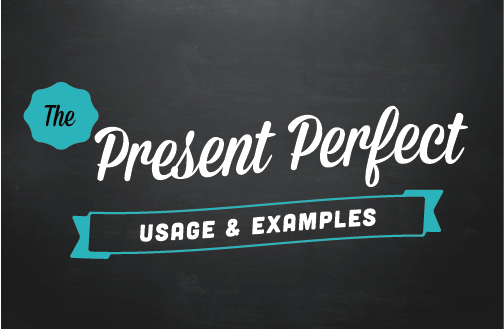
Are you wondering when to use the present perfect tense? Or I should say, "have you learned" when to use the present perfect? We use this tense to talk about an action that started in the past and has a connection to the present.
[Note: Click here to learn how to form the present perfect.]
Use #1: Describe past situations / things that have a strong connection to the present
We use the present perfect simple to describe an action or state that started at an unknown or unspecified time in the past AND has a connection to the present .
Learners are sometimes confused by this. They ask, if this tense is called the "present" perfect, why are we talking about "past" actions? Excellent question.
With this tense we're talking about the past and the present . These actions or situations may have started and ended in the past but we are focusing on the effect of this action now in the present moment. Let's look at some examples to try to make this clearer:
- Your poor grades have become a problem. (The result now is that there is a problem.)
- Have you seen Selma? (Where is she now?)
- She 's gone to school. (She left home and is at school now.)
- Take off your shoes. I have just cleaned the floor. (A short while ago I mopped the dirty floor and it is clean now.)
- I can't find my keys. Have you seen them? (I lost my keys and can't find them now.)
- Have you done your homework? (Is your homework finished now?)
- I started but I haven't finished my homework yet. (My homework is not finished now.)
- I've been sick all day. (I'm still sick now.)
In each of these examples we are focusing on the result now or why the action is important at this present time.
Use #2: Describe past actions or conditions that continue in the present
It's usually easier for learners to understand the second use which is for actions that started in the past and are still continuing in the present moment.
The tense helps to answer " how long ago " something has been happening (in relation to now) or for how long a period of time something has been happening.
FOR / SINCE
We often use the words " since " (after a specific time) or " for " (a period of time) with this usage.
- We have lived here for 25 years.(We came here 25 years ago and still live here.)
- My parents have been married since 1967. (They're still married.)
- We 've waited 20 minutes already for the bus. (We are still waiting.)
- My daughter has been sick for a week.
- I haven’t slept for two days.
- We haven’t seen each other since high school.
- I haven’t had a drink since the accident.
- He hasn’t dated anyone since his wife left him.
- I haven’t smoked a cigarette for three months now.
Note : we cannot use the present perfect tense with a completed time word. For example:
- Wrong: We have seen the movie last night. (Correct: we saw the movie last night.)
- Wrong : Yesterday, I had worked very late. (Correct: Yesterday, I worked very late.)
With finished time words we use the present simple.
Use #3: To ask about whether we ever had past experiences
We frequently use the present perfect tense to ask or talk about whether someone has experienced something during their life (at any time in the past until this moment).
EVER / NEVER / BEFORE
Often, we use the words " ever " (in questions) and " never ". We will sometimes also add the word " before ."
- Have you ever eaten fried insects?
- No, I haven't tried fried insects and never will.
- Has Jimmy ever been this sick before?
- Have you taken private English lessons?
- I ' ve never travelled by train before.
- Have the children ever done something like this before?
- Never in my life have I been so much in love.
Adverbs that are frequently used with the present perfect tense: Already / yet / just / still
The following words (adverbials) are often used with the present perfect tense:
Just describes something that happened a short time before this moment.
- I 've just received your email and will read it now.
- He 's just arrived , I hear the car pulling to the garage.
- I'm so excited. Lady Gaga has just released her latest album.
Just about means that something that was started is almost finished .
- I 've just about finished this novel.
- Have you finished the report yet? Just about .
- I 've just about used up all the milk.
Already has two main meanings:
1. Already = before this time (before now)
- Where's that letter? I 've already mailed it.
- Can I help you clean? I 've already swept to the floor but you can vacuum the carpet.
- We 've already eaten at that restaurant so let's go somewhere else.
2. Already = so soon (something happened quickly or earlier than expected)
- We need to take the trash out. I 've already taken it out.
- Has my boyfriend arrived already? I'm still getting dressed.
- You don't have to ask. Your mother has already ironed your shirt.
Yet = at this time , until this time , as soon as this time
Note : Yet usually comes at the end of the sentence. We use yet with negative statements and questions.
- Have my parents arrived yet? (They are expected to arrive soon.)
- Have you finished the report yet? (It should be done or finished soon.)
- He hasn't called yet. (Until this time he hasn't called but he should call soon.)
- It's 3 o'clock and I haven't had lunch yet .
We use still in negative sentences with the present perfect to emphasize an action or situation happening or existing before now and continuing into the present:
- I can't believe you still haven't written your paper.
- He said he sent an email an hour ago but I still haven't received it.
- We still haven't decided what to eat for lunch.
If you need to review how to form the present perfect tense please check this page. I go over the positive and negative forms, questions, review the irregular past participles and spelling changes and give lots of examples.
- Main Grammar Page
- Using the Present Perfect
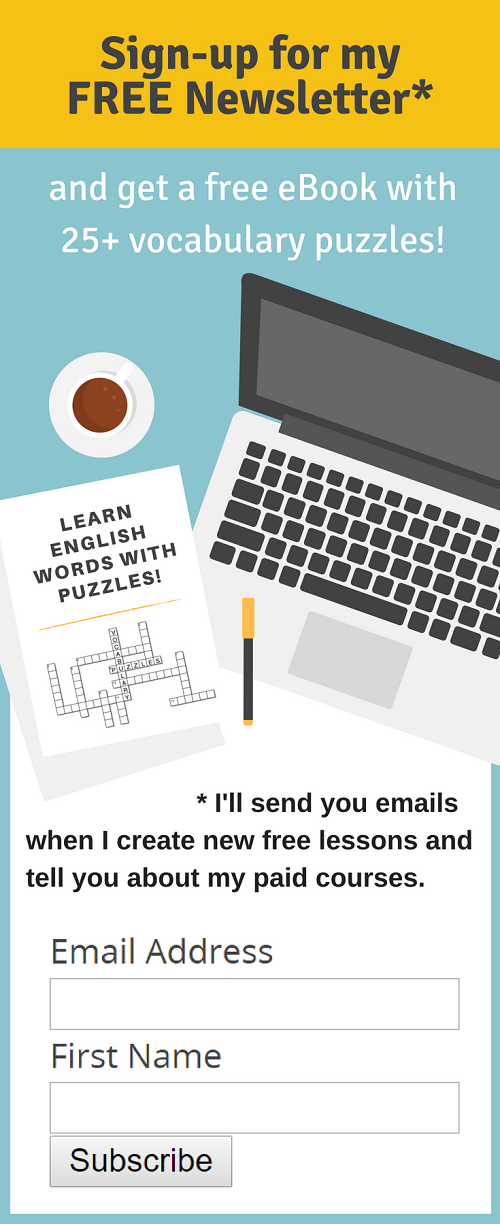
Listening | TED Talks | Speaking | Grammar | Vocabulary | Idioms | Blog
Copyright © 2013-2024 OysterEnglish.com All rights reserved | Privacy policy
- Dictionaries home
- American English
- Collocations
- German-English
- Grammar home
- Practical English Usage
- Learn & Practise Grammar (Beta)
- Word Lists home
- My Word Lists
- Recent additions
- Resources home
- Text Checker
- I 've already visited three universities.
- She 's just won the match.
- I haven't made a decision yet .
- ‘ Have you seen that new film yet ? ’ ‘ Yes, I have . / No, I haven't . ’
- visit → visit ed arrive → arriv ed
- have, had → had lose, lost → lost
- do, did → done eat, ate → eaten
- They 've just made a big announcement.
- Have you finished that book yet ?
- Spring has already arrived in Madrid!
- Practice 1 Gap-fill
- Practice 2 Gap-fill
- Practice 3 Multiple choice
- Practice 4 Multiple choice
- Practice 5 Gap-fill
- Practice 6 Multiple choice
- Practice 7 Multiple choice
- Practice 8 Gap-fill
- Practice 9 Gap-fill
- Practice 10 Gap-fill
- Practice 11 Gap-fill

- All Lessons
- business english
- comprehension
- culture & tips
- expressions
- pronunciation
English Grammar – Using ALREADY & YET
about engVid
Learn English for free with 2056 video lessons by experienced teachers. Classes cover English grammar, vocabulary, pronunciation, IELTS, TOEFL, and more. Join millions of English learners worldwide who are improving every day with engVid.
- 2-Intermediate
- Uncategorized
- Privacy Policy
© 2024 LearnVid Inc.
Already and Yet with Present Perfect Tense - Practice
Exercise. Do we use for or since with the following time references?
- I haven't phoned home --- for since Christmas.
- We've been here --- for since nine o'clock.
- I have worked for International House --- for since more than eight years.
- I haven't visited my home town --- for since I left school.
- I haven't been to the cinema --- for since ages.
- I have studied non-stop --- for since 9.15.
- I have had a driving licence --- for since I was eighteen.
- She hasn't had a day off --- for since 1999.
- Johan has been in England --- for since more than two weeks now.
- Peter has been my best friend --- for since we were nine.
Already and Yet with Present Perfect Tense - More Practice
Exercise. Decide if you need for or since with these time expressions.
Learn how to use 'for' and 'since' with the Present Perfect Tense
[ Present Perfect Tense - When to use ] [ Present Perfect Tense - How to form ] [ Present Perfect Tense - Already and Yet ] [ Present Perfect Tense - For and Since ] [ Present Perfect and Past Simple tenses ]
- Present Continuous Tense when to use; how to form; ing forms of the verbs; English action and state verbs; the difference between the Present Continuous and the Present Simple tenses; test.
- The verb to be - the Present Simple Tense . Grammar reference and online exercises for Elementary level.
- Cambridge Dictionary +Plus
Present perfect simple ( I have worked )
Present perfect simple: form.
We use have/has + the -ed form of the verb.
Verbs: the three basic forms
Present perfect simple: uses
We use the present perfect simple to refer to events in the past but which connect to the present.
Experiences
We use the present perfect simple to talk about our experiences up to now. The time of the experiences is not important:
[talking about musical theatre productions]
And I ’ve seen ‘Buddy’ and I ’ve seen ‘Starlight Express’ in London. And I want to see ‘Phantom of the Opera’ next.
We’re going to Wagamama’s for dinner tonight. I ’ve been there a couple of times before.
Although we do not give a specific time, we often use general time expressions like ever, never, before, in my life, so far, up until now with this use of the present perfect simple:
We haven’t met before , have we?
They ’ve sold 110 so far . ( so far = from a point in the past up until now)
We often use ever, not … ever and never when we talk about experiences:
It was the worst performance we have ever seen .
Have you ever tried to write your name and address with your left hand?
She ’s never said sorry for what she did.
We often use the present perfect simple for a unique experience when we are using a superlative:
I felt the happiest I have ever felt . My first Olympic final; the bronze medal; European record of 9.97 seconds.
The dome of the Blue Mosque at Isfahan is the most beautiful building I have ever seen .
It was the best decision I have ever made in my life.
It’s the worst sports programme I have ever seen and the first I have ever turned off.
We usually use the present perfect simple with the first time when we’re talking about an immediate, continuing or recent event:
That’s the first time I ’ve seen you get angry.
Recent completed events
We use the present perfect simple to talk about a finished event or state in the very recent past. We do not give a specific time. We often use words like just or recently for events taking place a very short time before now:
What’s this? What ’s just happened ?
The company employs around 400 staff and has recently opened an office in the UK.
Niki and John have just come back from a week in Spain.
Past events, present results
We use the present perfect simple when a single past action has a connection with the present:
She ’s broken her arm in two places. (Her arm is still broken now.)
Why haven’t you dressed in something warmer? (You got dressed in the past but the clothes are not warm enough for now.)
A fire has broken out at a disused hotel on the seafront. (The fire is burning now; it’s a recent event too.)
Your flowers haven’t arrived . (Your flowers are not here; they were supposed to arrive in the past.)
Time + for and since
We use the present perfect simple with for and since to talk about a present situation that began at a specific point in the past and is still going on in the present. We are looking back from the present to a point in the past.
How long …?
We often use expressions with for and since to answer the question How long …+ present perfect simple. We use the How long …? question to ask about the duration of a state or activity:
A: How long have you worked there? B: Since 21 August. So for about four months .
We use yet + the present perfect simple, mainly in questions and negative statements, to refer to things we intend to do in the future but which are not done:
Don’t wash up that cup. I haven’t finished my coffee yet . (I intend to finish it.)
Haven’t you done your homework yet ? (You intend to do it.)
We use already + the present perfect simple when we want to emphasise that something is done or achieved, often before the expected time:
I ’ve already booked my flight home.
A: Will you go and clean your teeth! B: I ’ve already cleaned them .
We use still + the present perfect simple when we want to emphasise that something we expected to happen continues not to happen:
She still hasn’t said sorry to me.
I feel really tired. I still haven’t recovered from the jet lag.
Introducing past time events
The present perfect simple is often used in newspaper headlines or TV news programmes to report a recent past event. It is then followed by a series of verbs in the past simple (underlined):
Charlton Heston has died aged 84, a spokesman for his family has said . Heston died on Saturday at his home in Beverly Hills. His wife Lydia, whom he married in 1944, was at his side. Heston won a best actor Oscar for his starring role in the epic ‘Ben Hur’.
We can also use the present perfect simple to introduce an ‘open’ general point about something. We can then use the past simple (underlined) to give more detailed specific information:
Have you seen any Arthur Miller plays? I saw a fantastic production of ‘The Crucible’.
American English
In American English the past simple is often used instead of the present perfect simple, often with already and yet .
British and American English

Word of the Day
Your browser doesn't support HTML5 audio
a device that measures air pressure and shows when the weather is likely to change

Hidden in plain sight: words and phrases connected with hiding

Learn more with +Plus
- Recent and Recommended {{#preferredDictionaries}} {{name}} {{/preferredDictionaries}}
- Definitions Clear explanations of natural written and spoken English English Learner’s Dictionary Essential British English Essential American English
- Grammar and thesaurus Usage explanations of natural written and spoken English Grammar Thesaurus
- Pronunciation British and American pronunciations with audio English Pronunciation
- English–Chinese (Simplified) Chinese (Simplified)–English
- English–Chinese (Traditional) Chinese (Traditional)–English
- English–Dutch Dutch–English
- English–French French–English
- English–German German–English
- English–Indonesian Indonesian–English
- English–Italian Italian–English
- English–Japanese Japanese–English
- English–Norwegian Norwegian–English
- English–Polish Polish–English
- English–Portuguese Portuguese–English
- English–Spanish Spanish–English
- English–Swedish Swedish–English
- Dictionary +Plus Word Lists
To add ${headword} to a word list please sign up or log in.
Add ${headword} to one of your lists below, or create a new one.
{{message}}
Something went wrong.
There was a problem sending your report.
Confirm Password *
By registering, you agree to the Terms of Service and Privacy Policy . *
Username or email *
Forgot Password
Lost your password? Please enter your email address. You will receive a link and will create a new password via email.
Sorry, you do not have permission to ask a question, You must login to ask a question.
Please briefly explain why you feel this question should be reported.
Please briefly explain why you feel this answer should be reported.
Please briefly explain why you feel this user should be reported.

English Notes
English notes latest questions, have you done your homework “yet” or “already”.
At this time, it is crucial to ensure that all necessary tasks have been completed in a timely manner. With that being said, have you completed your assigned homework “yet” or “already”? It is important to take responsibility for our academic responsibilities and make sure they are fulfilled promptly. By completing your homework “yet”, you demonstrate a proactive attitude towards your education and showcase your dedication to learning. On the other hand, finishing it “already” shows that you have prioritized your obligations and have managed your time effectively. Remember, staying on top of your assignments is crucial for academic success and sets a solid foundation for future endeavors.
- Share on WhatsApp
- Share on Facebook
- Share on Twitter
- Share on LinkedIn
You must login to add an answer.

Have an account?

Present perfect - just/already/yet
20 questions

Introducing new Paper mode
No student devices needed. Know more
- 1. Multiple Choice Edit 30 seconds 1 pt Have you done your homework .........? already yet just
- 2. Multiple Choice Edit 30 seconds 1 pt We haven't decided where to go ........... yet already just
- 3. Multiple Choice Edit 30 seconds 1 pt He has .............. finished doing the washing up! He can go out now!! already just yet
- 4. Multiple Choice Edit 30 seconds 1 pt We have ................ seen this movie. We went to the cinema last week. already yet just
- 5. Multiple Choice Edit 30 seconds 1 pt Have you seen the movie The Lord of the Ring ________? just already yet still
- 6. Multiple Choice Edit 30 seconds 1 pt The train’s ............................ left! What are we going to do? ever yet already never
- 7. Multiple Choice Edit 30 seconds 1 pt I haven't finished reading this book __________. yet just already
- 8. Multiple Choice Edit 30 seconds 1 pt I've ___________ watched this film, it was fantastic! just yet so far
- 9. Multiple Choice Edit 30 seconds 1 pt I've ______________ finished all my tasks for this week. already yet so far
- 10. Multiple Choice Edit 30 seconds 1 pt I've been married ____________ six years. for since
- 11. Multiple Choice Edit 30 seconds 1 pt I've worked for this company ___________ 2010. since for
- 12. Multiple Choice Edit 30 seconds 1 pt I haven't seen him _____________ Thursady. since for
- 13. Multiple Choice Edit 30 seconds 1 pt I've had this watch .................. 1965. since for
- 14. Multiple Choice Edit 30 seconds 1 pt She's been smoking ........................ a long time. since for
7. The company hasn’t sent a reply ______.
10. Don’t worry, I have ________ spoken to the police. They’ll be here any minute now.
9. I haven't phoned my parents________. I'll do it as soon as I get home.
- 18. Multiple Choice Edit 20 seconds 1 pt Monica ____ arrived at school. just has have just has just just have
- 19. Multiple Choice Edit 20 seconds 1 pt You _____________your homework yet. haven't finished have finished hasn't finished have finish
- 20. Multiple Choice Edit 20 seconds 1 pt I ____ my sandwich. just have eaten have just eated just ate have just eaten
Explore all questions with a free account

Continue with email
Continue with phone
- property taxes
Do you know how to protest your property taxes as deadline approaches? ABC13 speaks with expert

HOUSTON, Texas (KTRK) -- Most homeowners have gotten their property tax assessments in the mail by now, and the deadline to protest is coming up!
The video above is from ABC13's live-streaming channel.
ABC13 spoke with Colton Pace, a tax consultant with Ownwell, who said every owner has a right to appeal.
2022 REPORT: 'Unprecedented': Property tax bills have reached double value for Texas homeowners
The deadline to protest is on May 15, or 30 days from when the homeowner received their appraisal notice.
Pace said companies like his only charge homeowners after the fact.
He says to beware of companies or individuals looking for money upfront, regardless of whether they say they could save you money on your tax bill.
In Texas, homeowners can take on the protest process themselves online, in person, or on the phone.
RELATED: Will the renovations you made on your home during the pandemic affect your property taxes?
They can also hire a company to protest their appraisals for them.
For more information on the process, contact your county tax office.
For updates on this story, follow Briana Conner on Facebook , X and Instagram .
RELATED: Texans are paying the 7th highest property taxes in the United States, report shows
Related Topics
- PERSONAL FINANCE
- PROPERTY TAXES
Property Taxes

Houston mayor suggests tax hike to pay for new $1.3B firefighter deal

Harris County day cares could soon see big tax breaks

Texans are paying the 7th highest property taxes in US, report shows

Montrose looking at rebuild, but select property owners may foot bill
Top stories.

Troy Finner out as Houston police chief amid suspended cases scandal
- 3 hours ago

Angry driver hits victim's car, threatens him with gun, video shows

Cookware company founder says panhandler attacked her after giving $10

Mom says son was forced to pee on himself in PE class

ABC13, Chronicle discuss findings in Lakewood shooter investigation
Senior living complex residents frustrated with mold issues
HPD Chief Finner was emailed about suspended code in 2018
Harris County sheriff's chief of staff charged with injury to a child
- Grades 6-12
- School Leaders
Free printable Mother's Day questionnaire 💐!
72 Easy Science Experiments Using Materials You Already Have On Hand
Because science doesn’t have to be complicated.
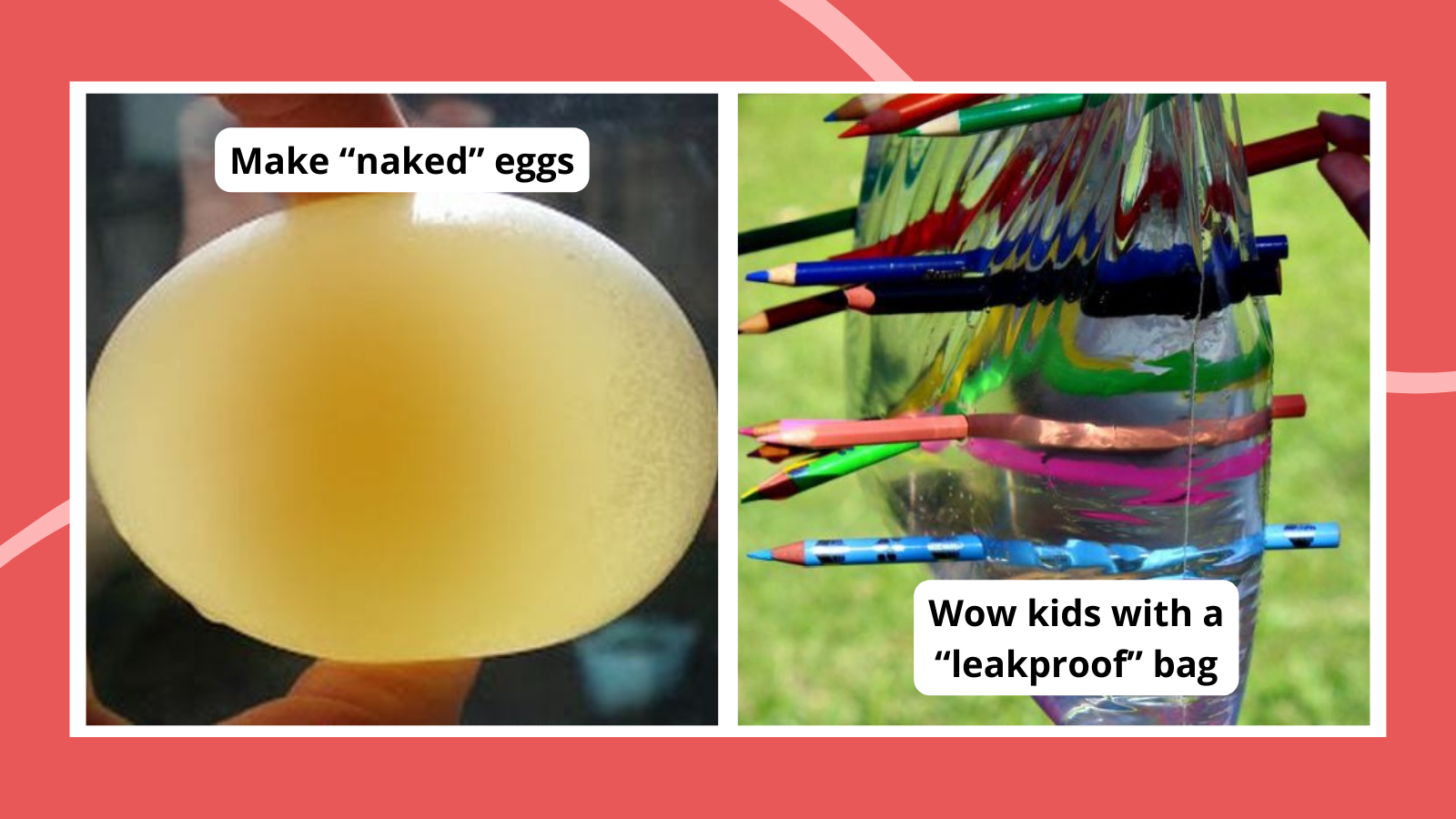
If there is one thing that is guaranteed to get your students excited, it’s a good science experiment! While some experiments require expensive lab equipment or dangerous chemicals, there are plenty of cool projects you can do with regular household items. We’ve rounded up a big collection of easy science experiments that anybody can try, and kids are going to love them!
Easy Chemistry Science Experiments
Easy physics science experiments, easy biology and environmental science experiments, easy engineering experiments and stem challenges.
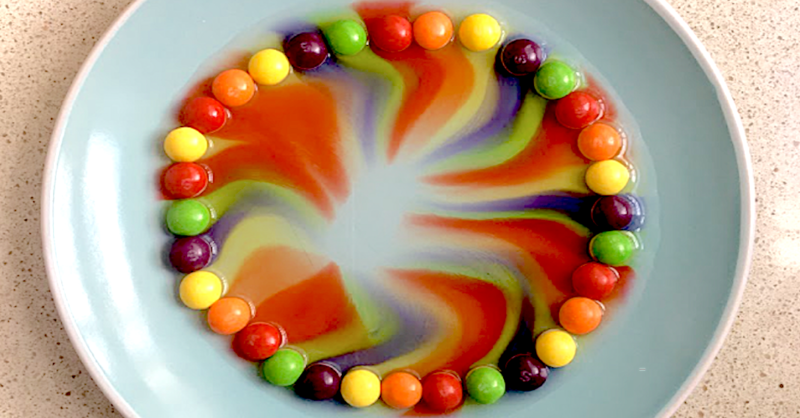
1. Taste the Rainbow
Teach your students about diffusion while creating a beautiful and tasty rainbow! Tip: Have extra Skittles on hand so your class can eat a few!
Learn more: Skittles Diffusion
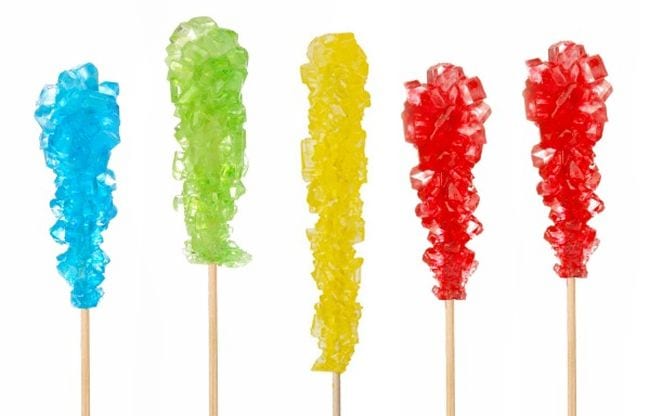
2. Crystallize sweet treats
Crystal science experiments teach kids about supersaturated solutions. This one is easy to do at home, and the results are absolutely delicious!
Learn more: Candy Crystals
3. Make a volcano erupt
This classic experiment demonstrates a chemical reaction between baking soda (sodium bicarbonate) and vinegar (acetic acid), which produces carbon dioxide gas, water, and sodium acetate.
Learn more: Best Volcano Experiments
4. Make elephant toothpaste
This fun project uses yeast and a hydrogen peroxide solution to create overflowing “elephant toothpaste.” Tip: Add an extra fun layer by having kids create toothpaste wrappers for plastic bottles.
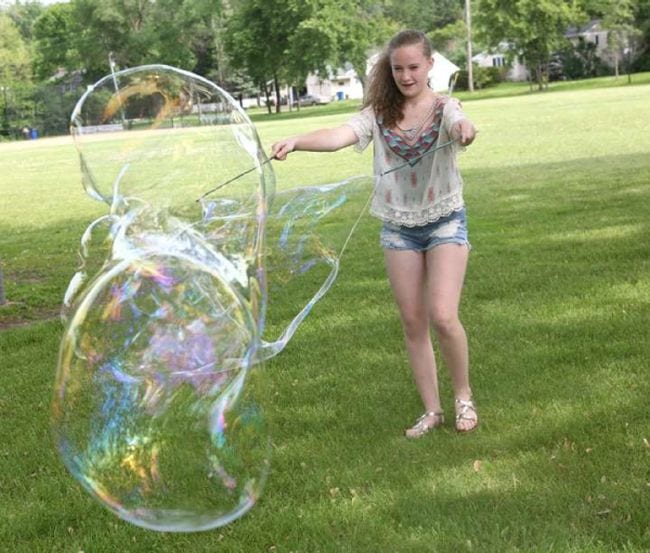
5. Blow the biggest bubbles you can
Add a few simple ingredients to dish soap solution to create the largest bubbles you’ve ever seen! Kids learn about surface tension as they engineer these bubble-blowing wands.
Learn more: Giant Soap Bubbles
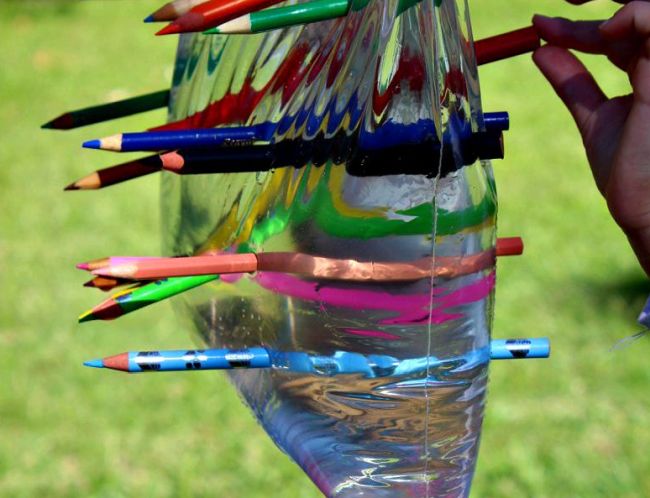
6. Demonstrate the “magic” leakproof bag
All you need is a zip-top plastic bag, sharp pencils, and water to blow your kids’ minds. Once they’re suitably impressed, teach them how the “trick” works by explaining the chemistry of polymers.
Learn more: Leakproof Bag
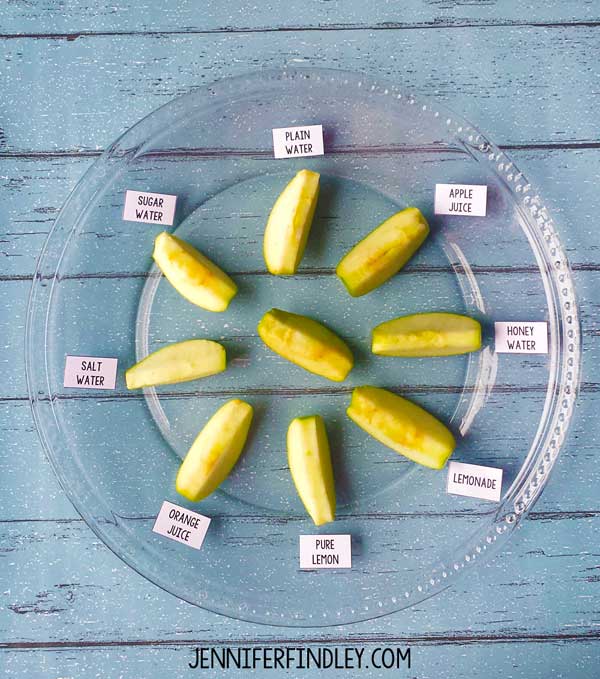
7. Use apple slices to learn about oxidation
Have students make predictions about what will happen to apple slices when immersed in different liquids, then put those predictions to the test. Have them record their observations.
Learn more: Apple Oxidation
8. Float a marker man
Their eyes will pop out of their heads when you “levitate” a stick figure right off the table! This experiment works due to the insolubility of dry-erase marker ink in water, combined with the lighter density of the ink.
Learn more: Floating Marker Man

9. Discover density with hot and cold water
There are a lot of easy science experiments you can do with density. This one is extremely simple, involving only hot and cold water and food coloring, but the visuals make it appealing and fun.
Learn more: Layered Water
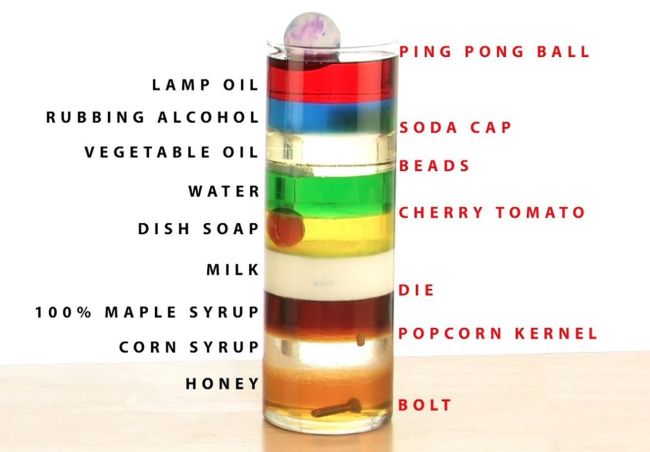
10. Layer more liquids
This density demo is a little more complicated, but the effects are spectacular. Slowly layer liquids like honey, dish soap, water, and rubbing alcohol in a glass. Kids will be amazed when the liquids float one on top of the other like magic (except it is really science).
Learn more: Layered Liquids
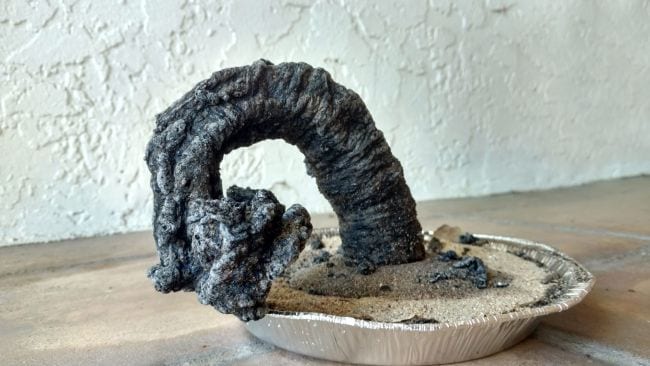
11. Grow a carbon sugar snake
Easy science experiments can still have impressive results! This eye-popping chemical reaction demonstration only requires simple supplies like sugar, baking soda, and sand.
Learn more: Carbon Sugar Snake
12. Mix up some slime
Tell kids you’re going to make slime at home, and watch their eyes light up! There are a variety of ways to make slime, so try a few different recipes to find the one you like best.
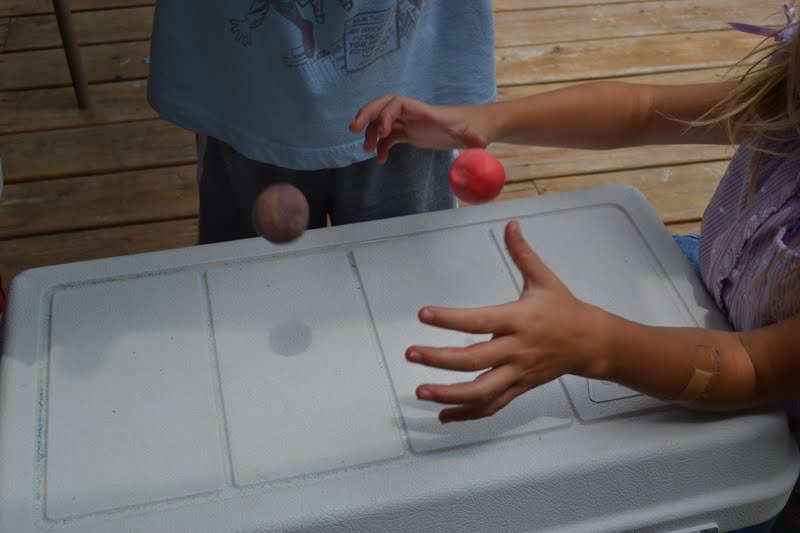

13. Make homemade bouncy balls
These homemade bouncy balls are easy to make since all you need is glue, food coloring, borax powder, cornstarch, and warm water. You’ll want to store them inside a container like a plastic egg because they will flatten out over time.
Learn more: Make Your Own Bouncy Balls

14. Create eggshell chalk
Eggshells contain calcium, the same material that makes chalk. Grind them up and mix them with flour, water, and food coloring to make your very own sidewalk chalk.
Learn more: Eggshell Chalk
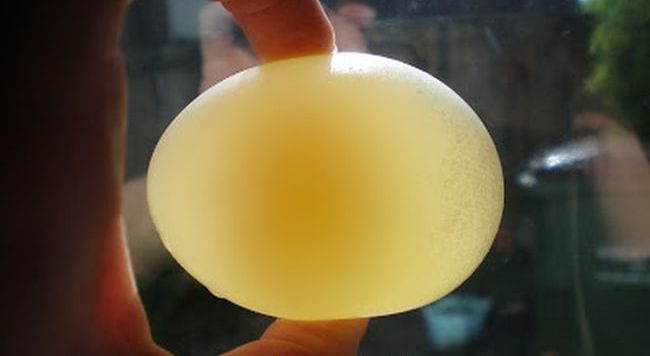
15. Make naked eggs
This is so cool! Use vinegar to dissolve the calcium carbonate in an eggshell to discover the membrane underneath that holds the egg together. Then, use the “naked” egg for another easy science experiment that demonstrates osmosis .
Learn more: Naked Egg Experiment
16. Turn milk into plastic
This sounds a lot more complicated than it is, but don’t be afraid to give it a try. Use simple kitchen supplies to create plastic polymers from plain old milk. Sculpt them into cool shapes when you’re done!
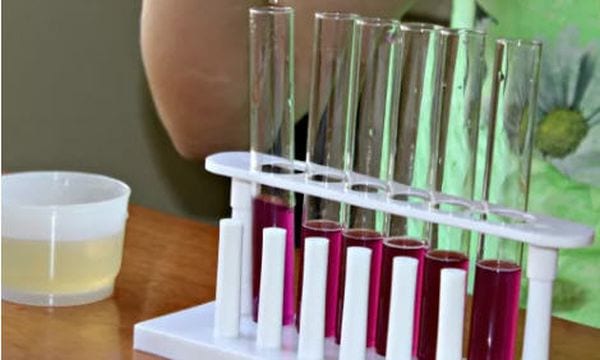
17. Test pH using cabbage
Teach kids about acids and bases without needing pH test strips! Simply boil some red cabbage and use the resulting water to test various substances—acids turn red and bases turn green.
Learn more: Cabbage pH
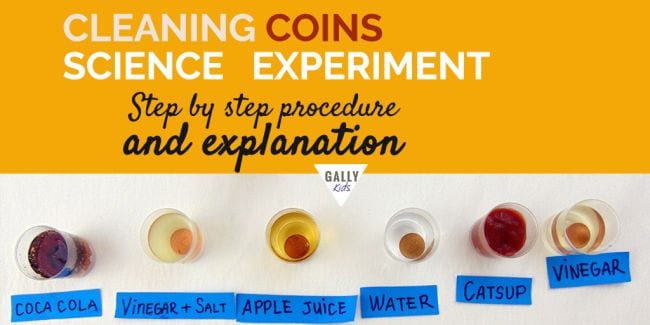
18. Clean some old coins
Use common household items to make old oxidized coins clean and shiny again in this simple chemistry experiment. Ask kids to predict (hypothesize) which will work best, then expand the learning by doing some research to explain the results.
Learn more: Cleaning Coins
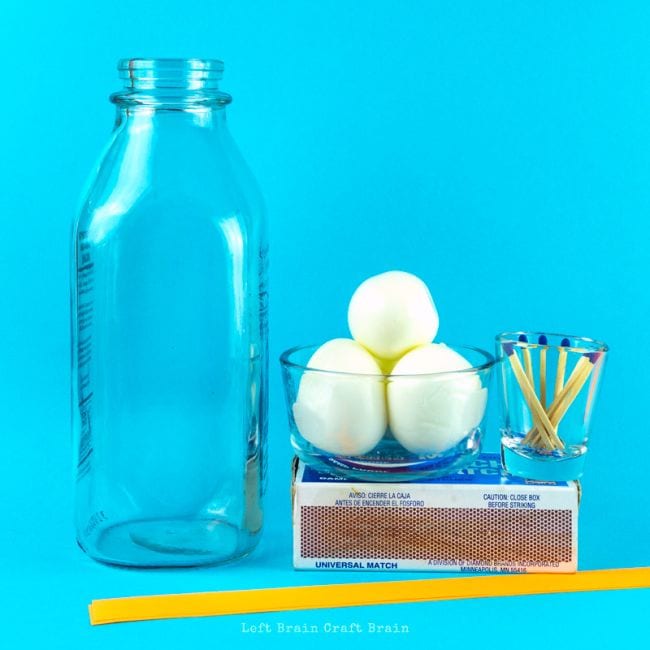
19. Pull an egg into a bottle
This classic easy science experiment never fails to delight. Use the power of air pressure to suck a hard-boiled egg into a jar, no hands required.
Learn more: Egg in a Bottle
20. Blow up a balloon (without blowing)
Chances are good you probably did easy science experiments like this when you were in school. The baking soda and vinegar balloon experiment demonstrates the reactions between acids and bases when you fill a bottle with vinegar and a balloon with baking soda.
21 Assemble a DIY lava lamp
This 1970s trend is back—as an easy science experiment! This activity combines acid-base reactions with density for a totally groovy result.
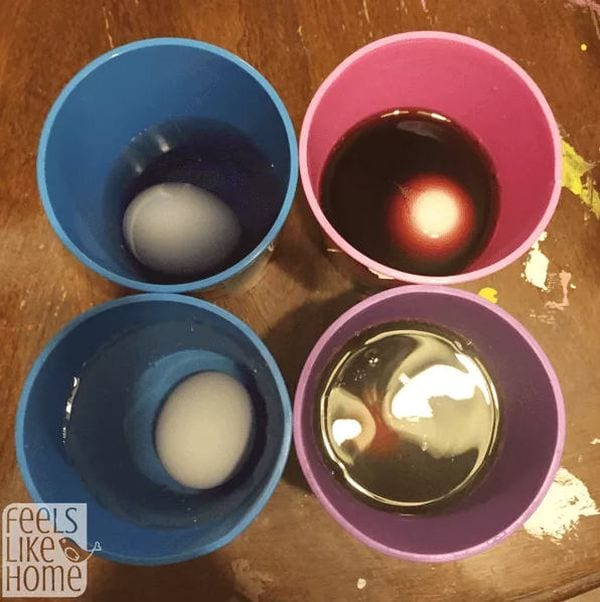
22. Explore how sugary drinks affect teeth
The calcium content of eggshells makes them a great stand-in for teeth. Use eggs to explore how soda and juice can stain teeth and wear down the enamel. Expand your learning by trying different toothpaste-and-toothbrush combinations to see how effective they are.
Learn more: Sugar and Teeth Experiment
23. Mummify a hot dog
If your kids are fascinated by the Egyptians, they’ll love learning to mummify a hot dog! No need for canopic jars , just grab some baking soda and get started.
24. Extinguish flames with carbon dioxide
This is a fiery twist on acid-base experiments. Light a candle and talk about what fire needs in order to survive. Then, create an acid-base reaction and “pour” the carbon dioxide to extinguish the flame. The CO2 gas acts like a liquid, suffocating the fire.
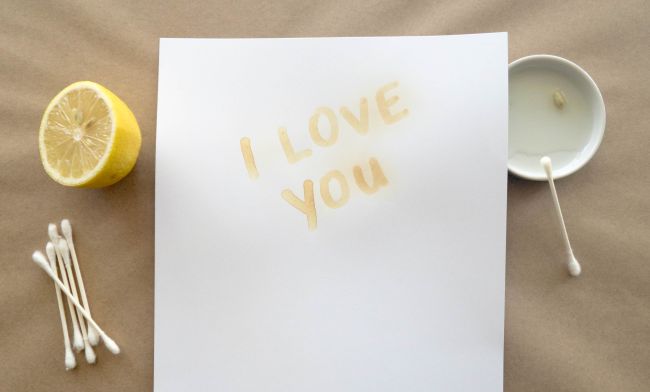
25. Send secret messages with invisible ink
Turn your kids into secret agents! Write messages with a paintbrush dipped in lemon juice, then hold the paper over a heat source and watch the invisible become visible as oxidation goes to work.
Learn more: Invisible Ink
26. Create dancing popcorn
This is a fun version of the classic baking soda and vinegar experiment, perfect for the younger crowd. The bubbly mixture causes popcorn to dance around in the water.
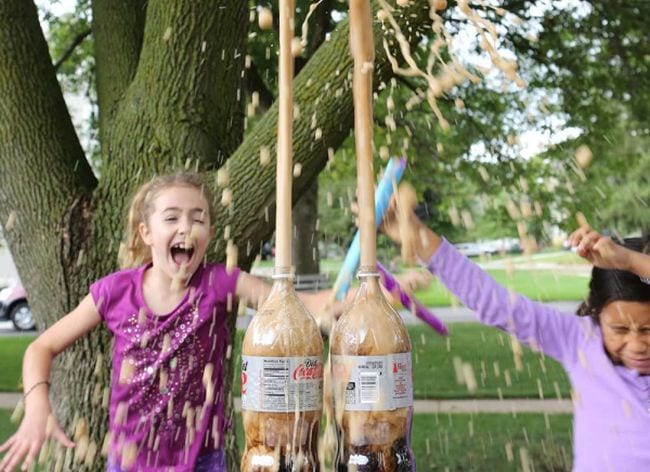
27. Shoot a soda geyser sky-high
You’ve always wondered if this really works, so it’s time to find out for yourself! Kids will marvel at the chemical reaction that sends diet soda shooting high in the air when Mentos are added.
Learn more: Soda Explosion
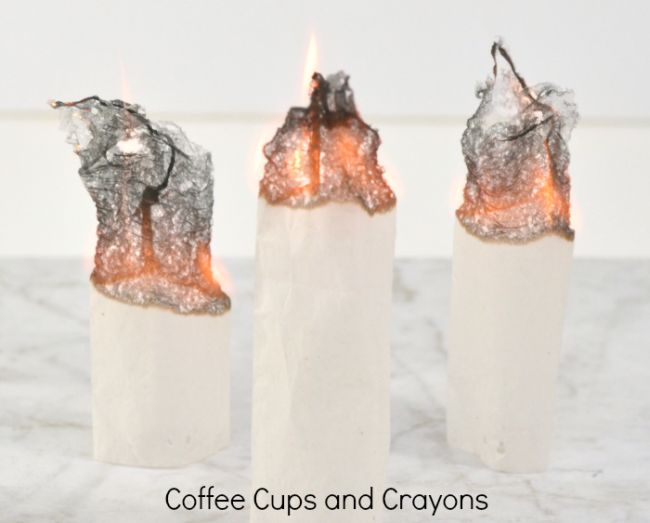
28. Send a teabag flying
Hot air rises, and this experiment can prove it! You’ll want to supervise kids with fire, of course. For more safety, try this one outside.
Learn more: Flying Tea Bags
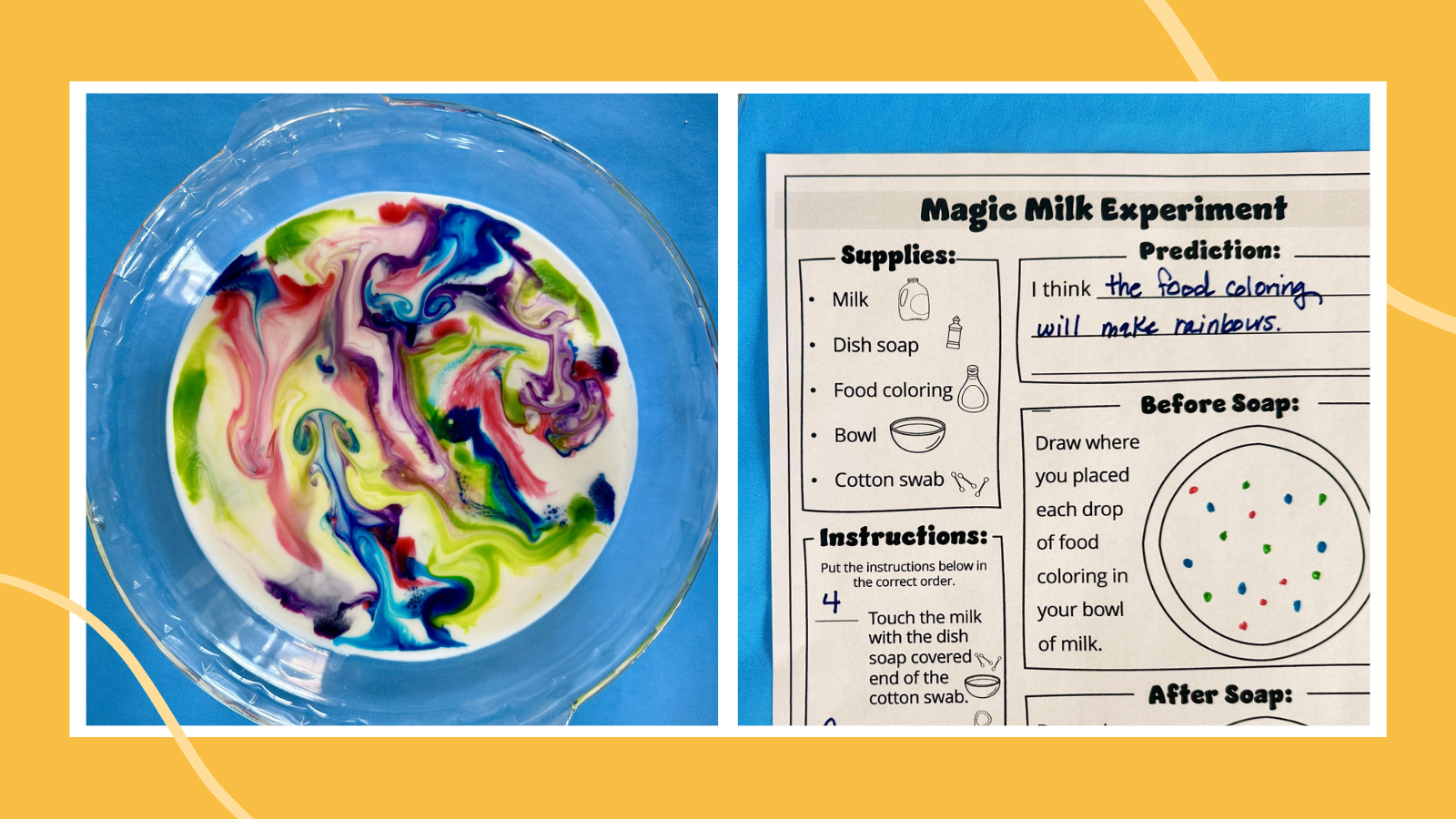
29. Create magic milk
This fun and easy science experiment demonstrates principles related to surface tension, molecular interactions, and fluid dynamics.
Learn more: Magic Milk Experiment
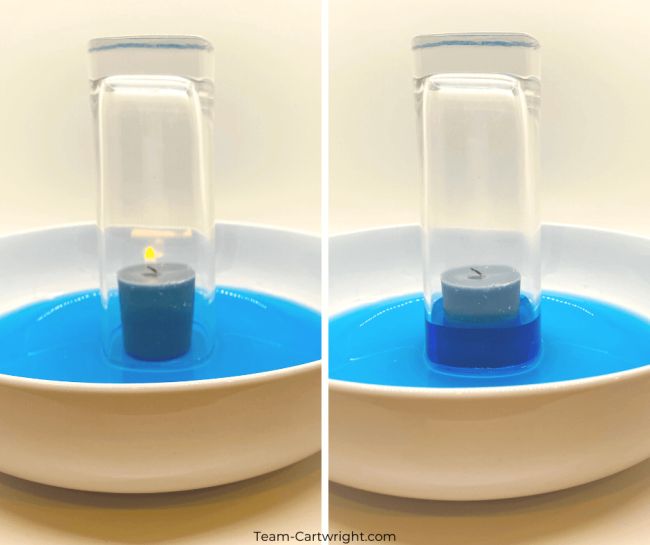
30. Watch the water rise
Learn about Charles’s Law with this simple experiment. As the candle burns, using up oxygen and heating the air in the glass, the water rises as if by magic.
Learn more: Rising Water
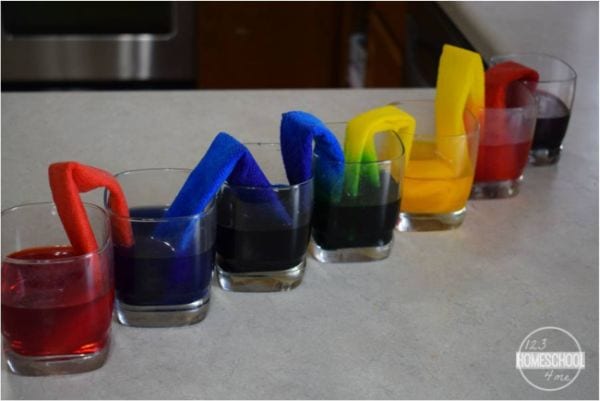
31. Learn about capillary action
Kids will be amazed as they watch the colored water move from glass to glass, and you’ll love the easy and inexpensive setup. Gather some water, paper towels, and food coloring to teach the scientific magic of capillary action.
Learn more: Capillary Action
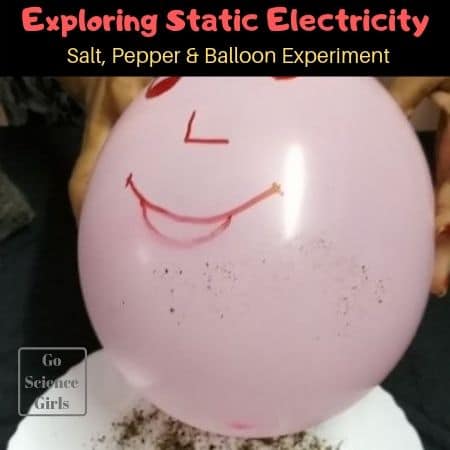
32. Give a balloon a beard
Equally educational and fun, this experiment will teach kids about static electricity using everyday materials. Kids will undoubtedly get a kick out of creating beards on their balloon person!
Learn more: Static Electricity
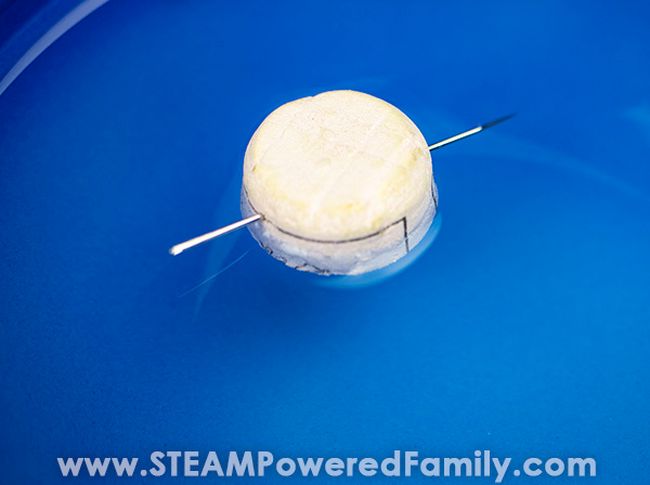
33. Find your way with a DIY compass
Here’s an old classic that never fails to impress. Magnetize a needle, float it on the water’s surface, and it will always point north.
Learn more: DIY Compass
34. Crush a can using air pressure
Sure, it’s easy to crush a soda can with your bare hands, but what if you could do it without touching it at all? That’s the power of air pressure!

35. Tell time using the sun
While people use clocks or even phones to tell time today, there was a time when a sundial was the best means to do that. Kids will certainly get a kick out of creating their own sundials using everyday materials like cardboard and pencils.
Learn more: Make Your Own Sundial
36. Launch a balloon rocket
Grab balloons, string, straws, and tape, and launch rockets to learn about the laws of motion.
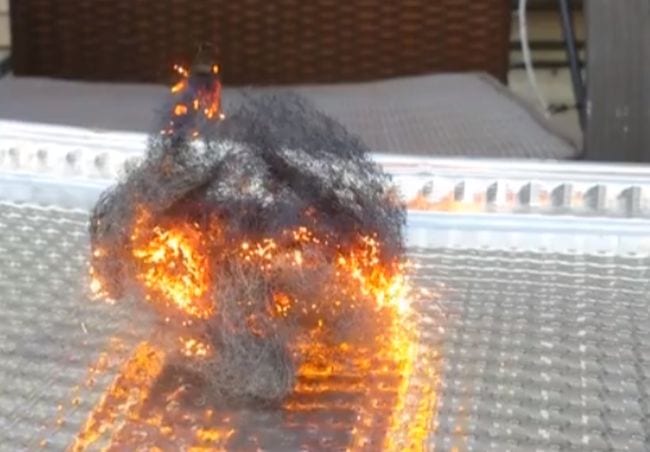
37. Make sparks with steel wool
All you need is steel wool and a 9-volt battery to perform this science demo that’s bound to make their eyes light up! Kids learn about chain reactions, chemical changes, and more.
Learn more: Steel Wool Electricity
38. Levitate a Ping-Pong ball
Kids will get a kick out of this experiment, which is really all about Bernoulli’s principle. You only need plastic bottles, bendy straws, and Ping-Pong balls to make the science magic happen.
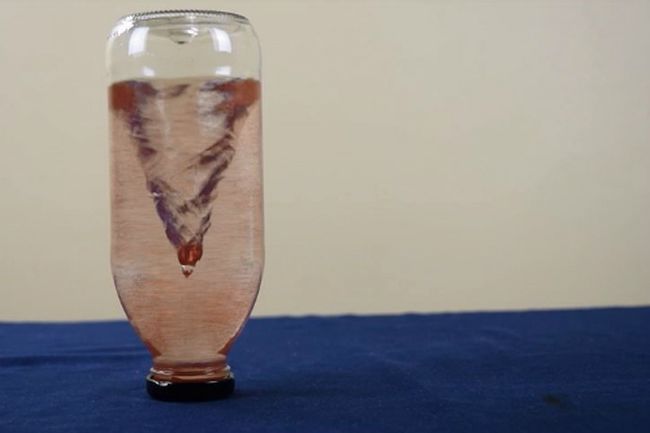
39. Whip up a tornado in a bottle
There are plenty of versions of this classic experiment out there, but we love this one because it sparkles! Kids learn about a vortex and what it takes to create one.
Learn more: Tornado in a Bottle
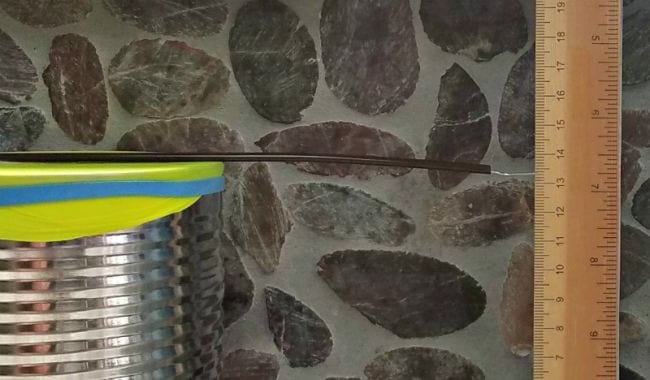
40. Monitor air pressure with a DIY barometer
This simple but effective DIY science project teaches kids about air pressure and meteorology. They’ll have fun tracking and predicting the weather with their very own barometer.
Learn more: DIY Barometer
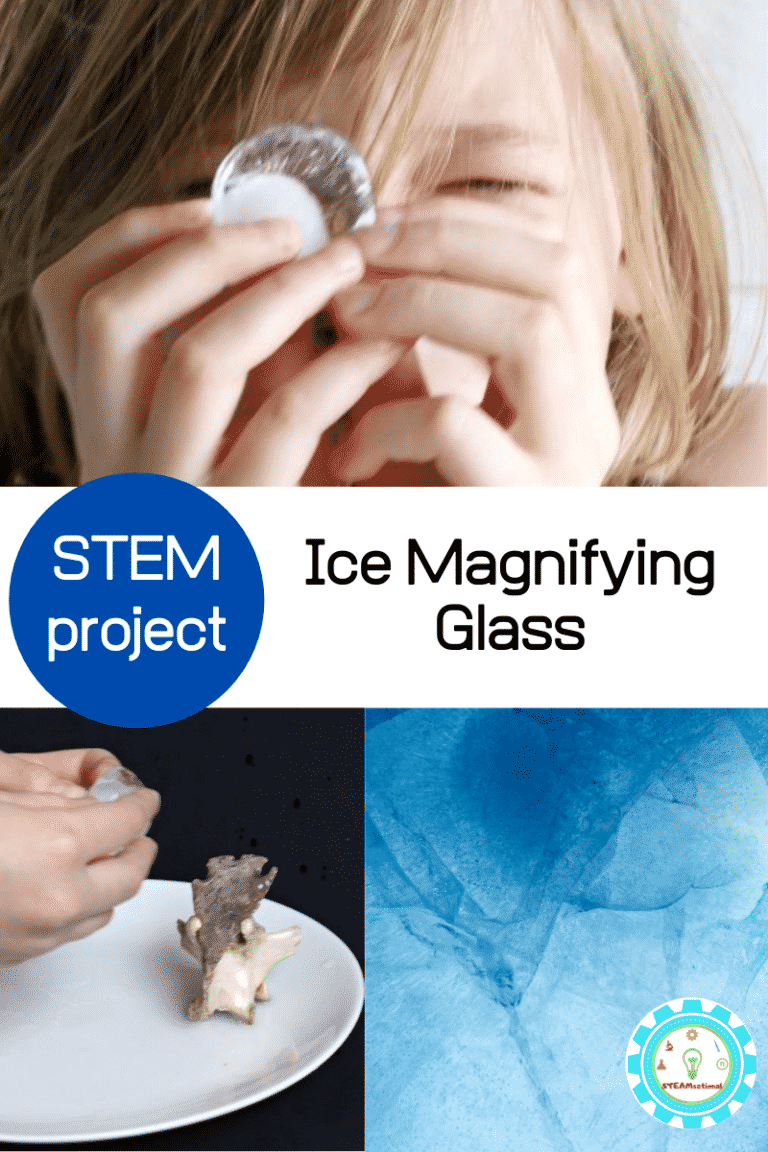
41. Peer through an ice magnifying glass
Students will certainly get a thrill out of seeing how an everyday object like a piece of ice can be used as a magnifying glass. Be sure to use purified or distilled water since tap water will have impurities in it that will cause distortion.
Learn more: Ice Magnifying Glass
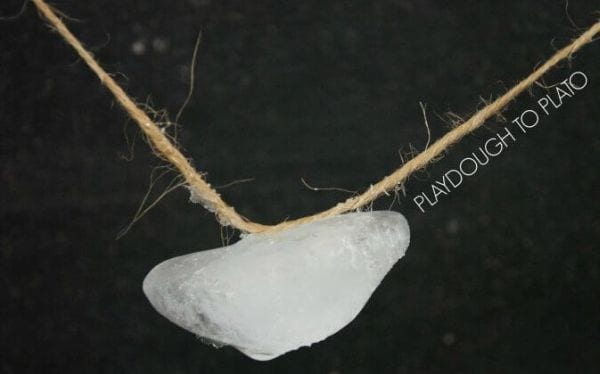
42. String up some sticky ice
Can you lift an ice cube using just a piece of string? This quick experiment teaches you how. Use a little salt to melt the ice and then refreeze the ice with the string attached.
Learn more: Sticky Ice
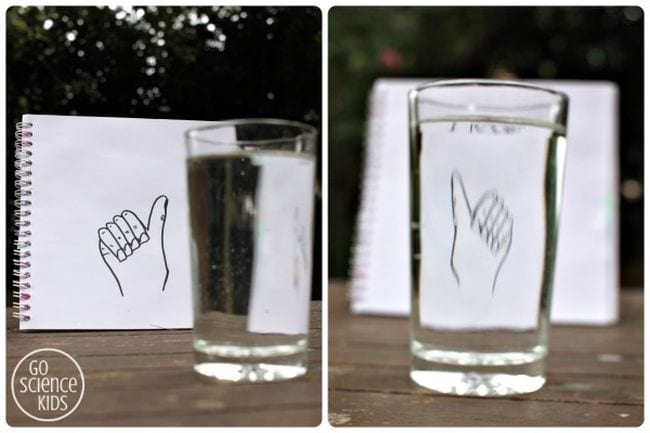
43. “Flip” a drawing with water
Light refraction causes some really cool effects, and there are multiple easy science experiments you can do with it. This one uses refraction to “flip” a drawing; you can also try the famous “disappearing penny” trick .
Learn more: Light Refraction With Water
44. Color some flowers
We love how simple this project is to re-create since all you’ll need are some white carnations, food coloring, glasses, and water. The end result is just so beautiful!
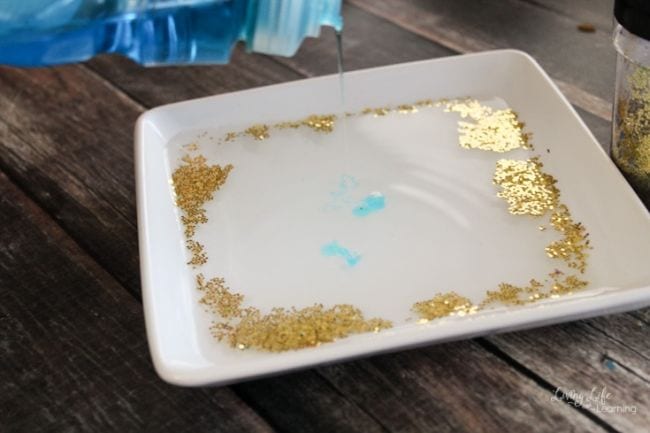
45. Use glitter to fight germs
Everyone knows that glitter is just like germs—it gets everywhere and is so hard to get rid of! Use that to your advantage and show kids how soap fights glitter and germs.
Learn more: Glitter Germs
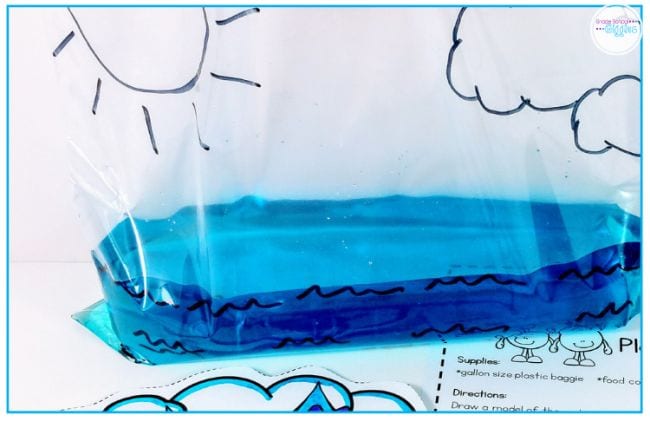
46. Re-create the water cycle in a bag
You can do so many easy science experiments with a simple zip-top bag. Fill one partway with water and set it on a sunny windowsill to see how the water evaporates up and eventually “rains” down.
Learn more: Water Cycle
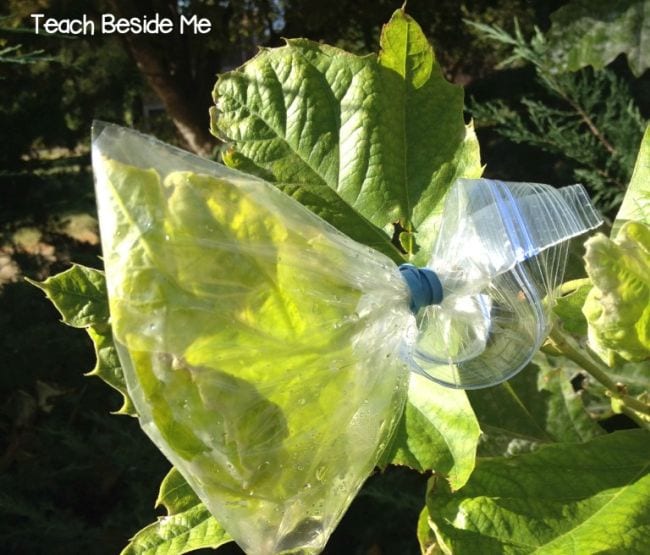
47. Learn about plant transpiration
Your backyard is a terrific place for easy science experiments. Grab a plastic bag and rubber band to learn how plants get rid of excess water they don’t need, a process known as transpiration.
Learn more: Plant Transpiration
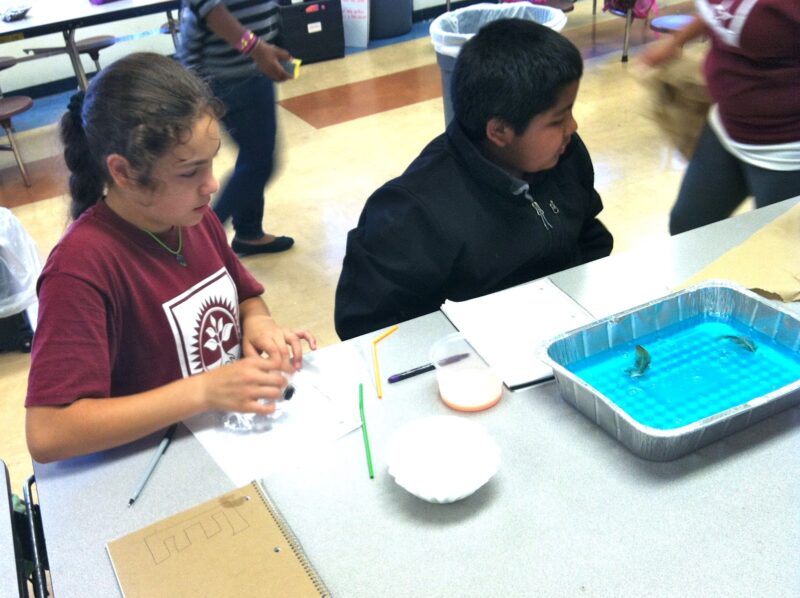
48. Clean up an oil spill
Before conducting this experiment, teach your students about engineers who solve environmental problems like oil spills. Then, have your students use provided materials to clean the oil spill from their oceans.
Learn more: Oil Spill
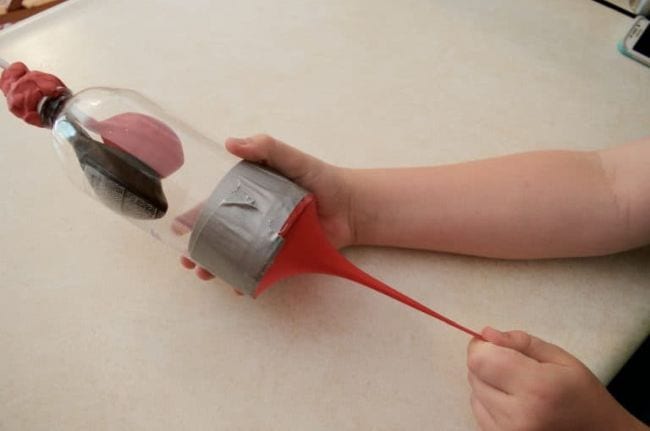
49. Construct a pair of model lungs
Kids get a better understanding of the respiratory system when they build model lungs using a plastic water bottle and some balloons. You can modify the experiment to demonstrate the effects of smoking too.
Learn more: Model Lungs
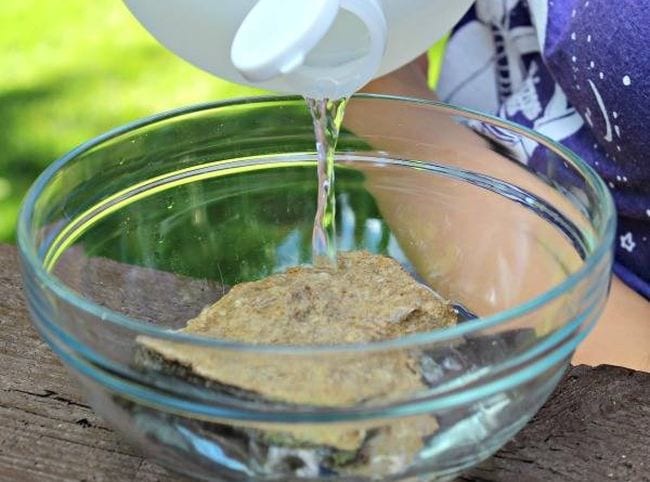
50. Experiment with limestone rocks
Kids love to collect rocks, and there are plenty of easy science experiments you can do with them. In this one, pour vinegar over a rock to see if it bubbles. If it does, you’ve found limestone!
Learn more: Limestone Experiments
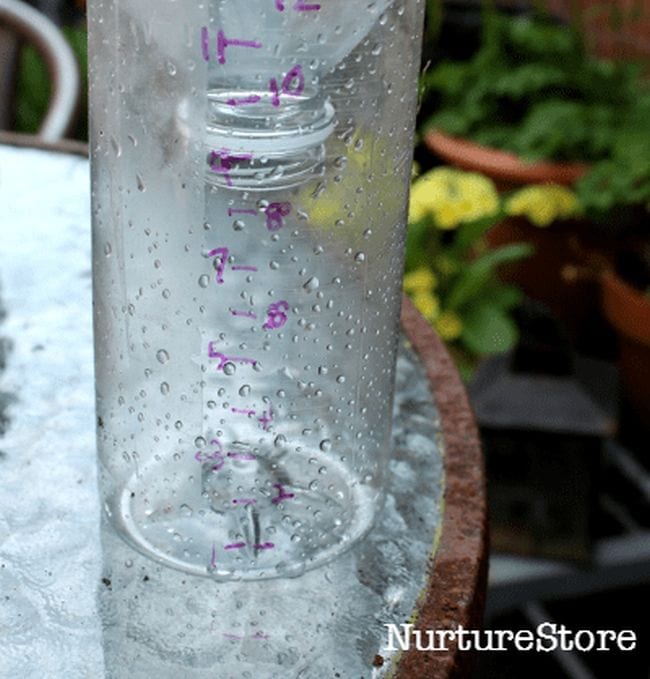
51. Turn a bottle into a rain gauge
All you need is a plastic bottle, a ruler, and a permanent marker to make your own rain gauge. Monitor your measurements and see how they stack up against meteorology reports in your area.
Learn more: DIY Rain Gauge
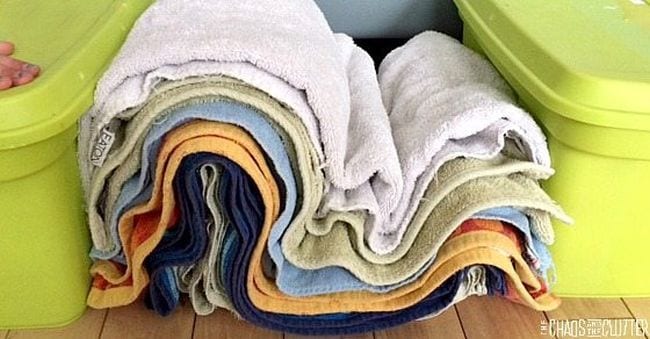
52. Build up towel mountains
This clever demonstration helps kids understand how some landforms are created. Use layers of towels to represent rock layers and boxes for continents. Then pu-u-u-sh and see what happens!
Learn more: Towel Mountains
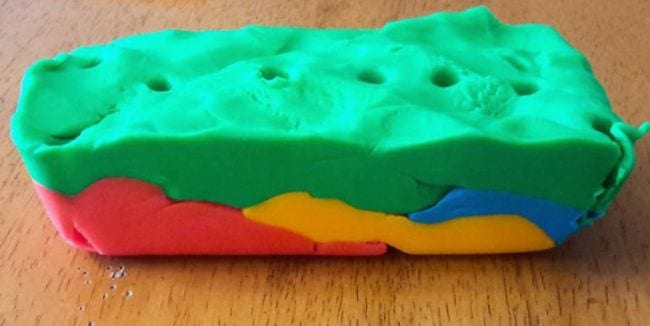
53. Take a play dough core sample
Learn about the layers of the earth by building them out of Play-Doh, then take a core sample with a straw. ( Love Play-Doh? Get more learning ideas here. )
Learn more: Play Dough Core Sampling
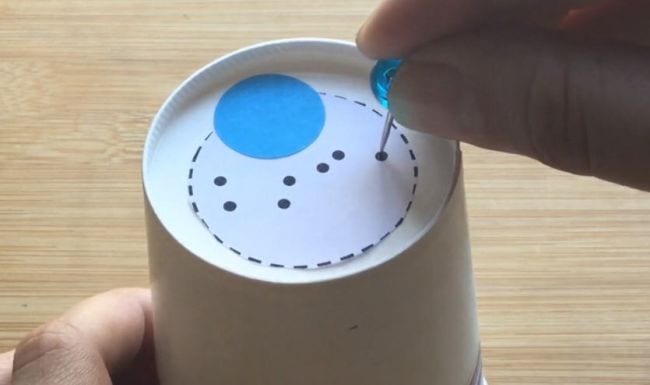
54. Project the stars on your ceiling
Use the video lesson in the link below to learn why stars are only visible at night. Then create a DIY star projector to explore the concept hands-on.
Learn more: DIY Star Projector
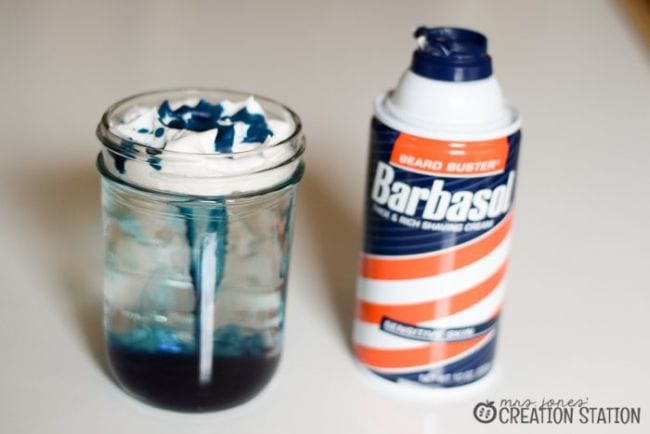
55. Make it rain
Use shaving cream and food coloring to simulate clouds and rain. This is an easy science experiment little ones will beg to do over and over.
Learn more: Shaving Cream Rain
56. Blow up your fingerprint
This is such a cool (and easy!) way to look at fingerprint patterns. Inflate a balloon a bit, use some ink to put a fingerprint on it, then blow it up big to see your fingerprint in detail.
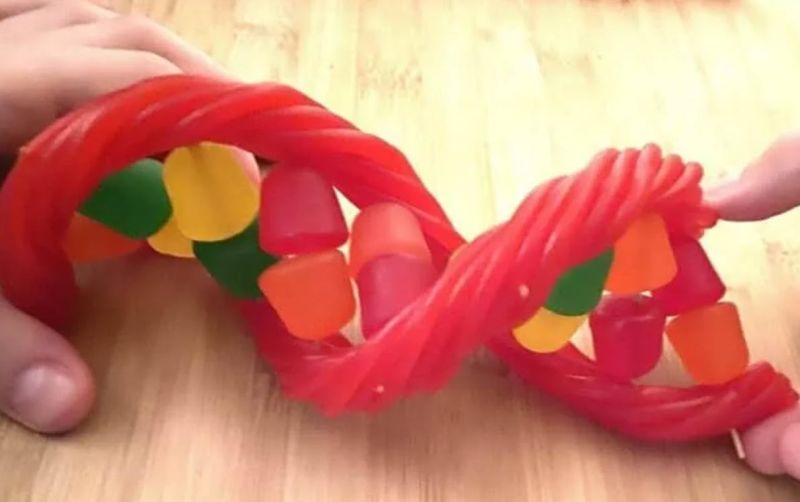
57. Snack on a DNA model
Twizzlers, gumdrops, and a few toothpicks are all you need to make this super-fun (and yummy!) DNA model.
Learn more: Edible DNA Model
58. Dissect a flower
Take a nature walk and find a flower or two. Then bring them home and take them apart to discover all the different parts of flowers.
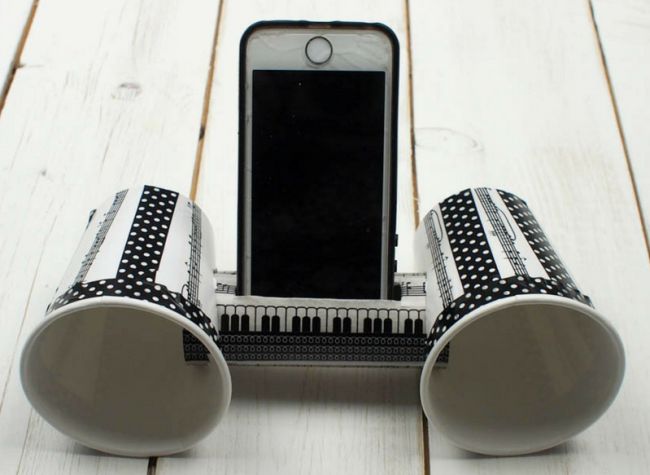
59. Craft smartphone speakers
No Bluetooth speaker? No problem! Put together your own from paper cups and toilet paper tubes.
Learn more: Smartphone Speakers
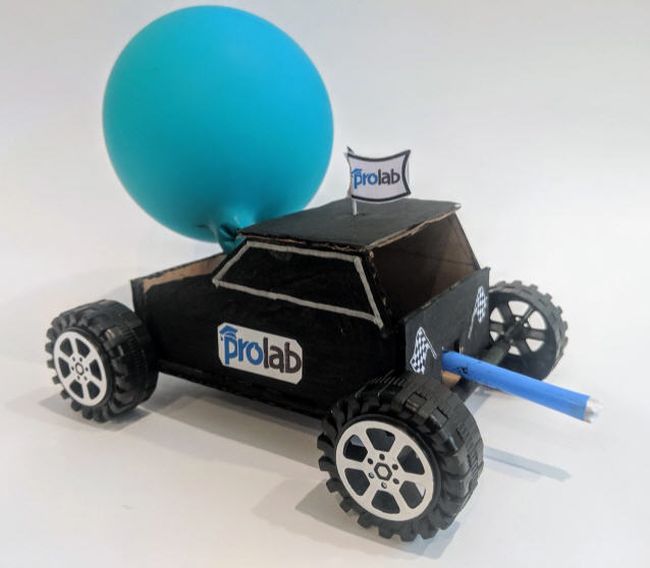
60. Race a balloon-powered car
Kids will be amazed when they learn they can put together this awesome racer using cardboard and bottle-cap wheels. The balloon-powered “engine” is so much fun too.
Learn more: Balloon-Powered Car
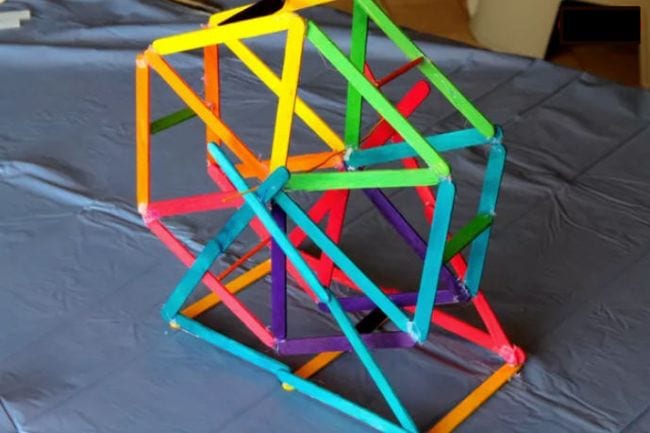
61. Build a Ferris wheel
You’ve probably ridden on a Ferris wheel, but can you build one? Stock up on wood craft sticks and find out! Play around with different designs to see which one works best.
Learn more: Craft Stick Ferris Wheel
62. Design a phone stand
There are lots of ways to craft a DIY phone stand, which makes this a perfect creative-thinking STEM challenge.
63. Conduct an egg drop
Put all their engineering skills to the test with an egg drop! Challenge kids to build a container from stuff they find around the house that will protect an egg from a long fall (this is especially fun to do from upper-story windows).
Learn more: Egg Drop Challenge Ideas
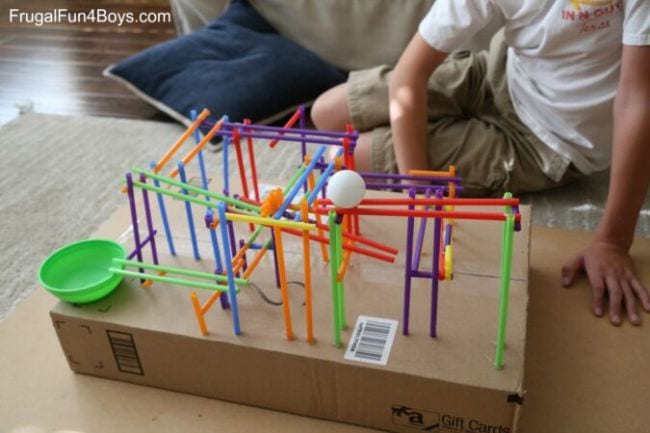
64. Engineer a drinking-straw roller coaster
STEM challenges are always a hit with kids. We love this one, which only requires basic supplies like drinking straws.
Learn more: Straw Roller Coaster
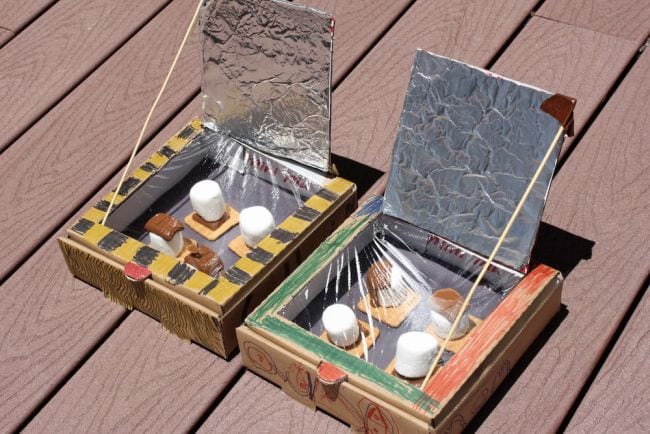
65. Build a solar oven
Explore the power of the sun when you build your own solar ovens and use them to cook some yummy treats. This experiment takes a little more time and effort, but the results are always impressive. The link below has complete instructions.
Learn more: Solar Oven
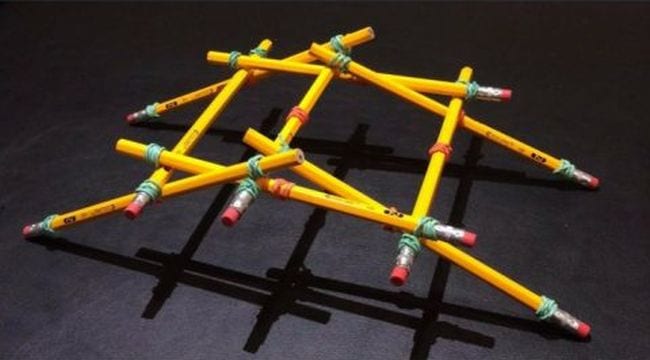
66. Build a Da Vinci bridge
There are plenty of bridge-building experiments out there, but this one is unique. It’s inspired by Leonardo da Vinci’s 500-year-old self-supporting wooden bridge. Learn how to build it at the link, and expand your learning by exploring more about Da Vinci himself.
Learn more: Da Vinci Bridge
67. Step through an index card
This is one easy science experiment that never fails to astonish. With carefully placed scissor cuts on an index card, you can make a loop large enough to fit a (small) human body through! Kids will be wowed as they learn about surface area.
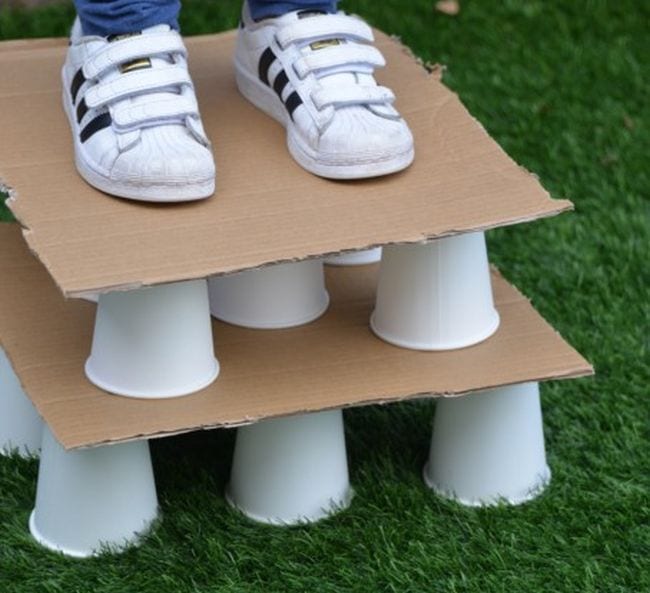
68. Stand on a pile of paper cups
Combine physics and engineering and challenge kids to create a paper cup structure that can support their weight. This is a cool project for aspiring architects.
Learn more: Paper Cup Stack
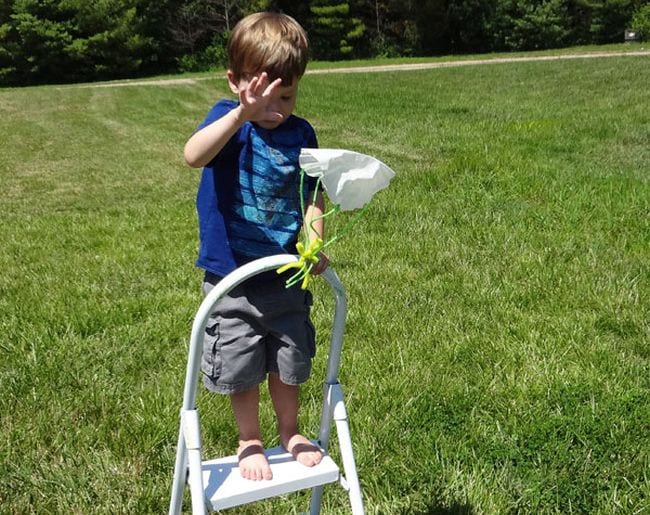
69. Test out parachutes
Gather a variety of materials (try tissues, handkerchiefs, plastic bags, etc.) and see which ones make the best parachutes. You can also find out how they’re affected by windy days or find out which ones work in the rain.
Learn more: Parachute Drop
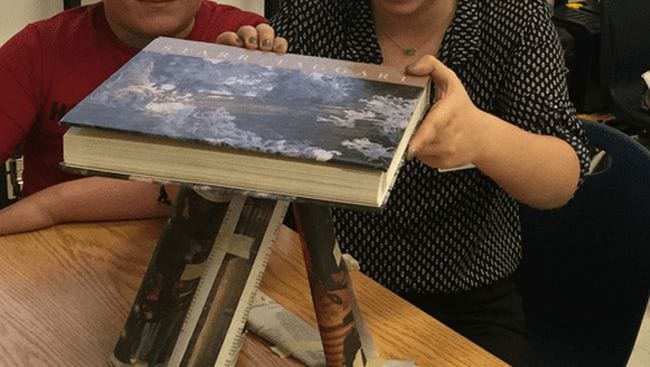
70. Recycle newspapers into an engineering challenge
It’s amazing how a stack of newspapers can spark such creative engineering. Challenge kids to build a tower, support a book, or even build a chair using only newspaper and tape!
Learn more: Newspaper STEM Challenge
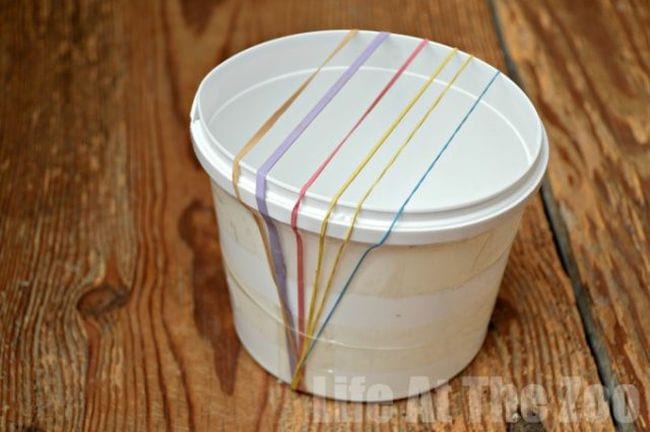
71. Use rubber bands to sound out acoustics
Explore the ways that sound waves are affected by what’s around them using a simple rubber band “guitar.” (Kids absolutely love playing with these!)
Learn more: Rubber Band Guitar
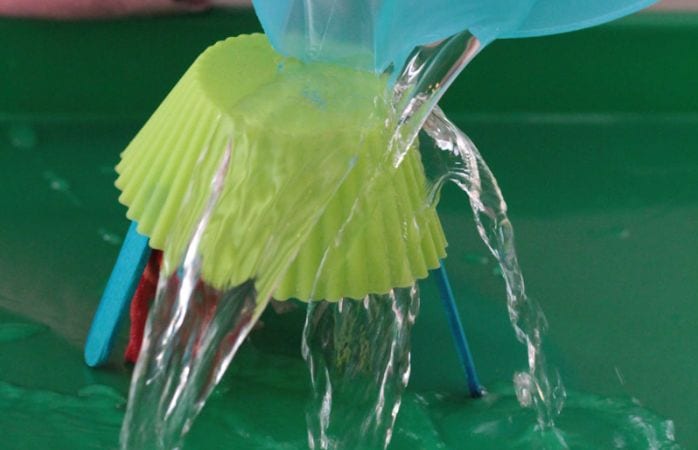
72. Assemble a better umbrella
Challenge students to engineer the best possible umbrella from various household supplies. Encourage them to plan, draw blueprints, and test their creations using the scientific method.
Learn more: Umbrella STEM Challenge
Plus, sign up for our newsletters to get all the latest learning ideas straight to your inbox.
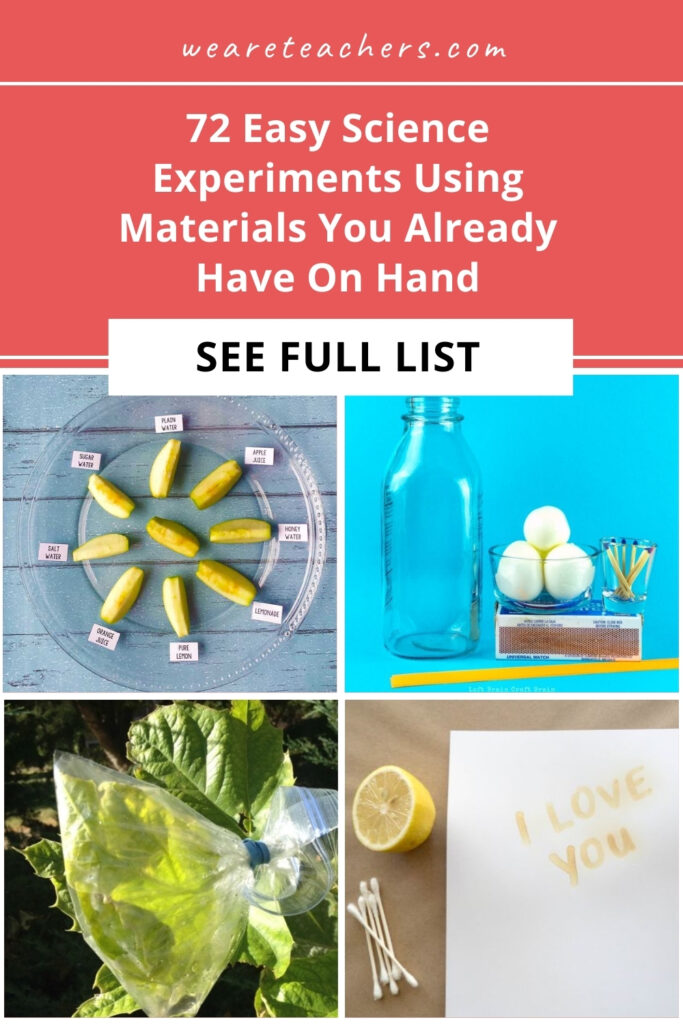
You Might Also Like
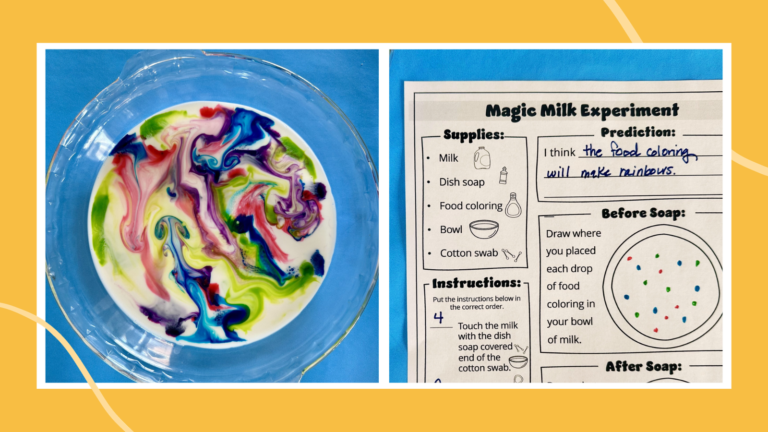
Magic Milk Experiment: How-To Plus Free Worksheet
This classic experiment teaches kids about basic chemistry and physics. Continue Reading
Copyright © 2024. All rights reserved. 5335 Gate Parkway, Jacksonville, FL 32256

Cicada map 2024: See where to find Brood XIX and XIII − and where they've already been spotted
For many Americans, the cicadas are here .
Trillions of periodical cicadas are already emerging in a rare, two brood event across multiple states , with more expected to come in the following weeks. Thanks to warm temperatures and good conditions, these 13- or 17-year cicadas are emerging from their underground habitats to eat, mate and die, making a whole lot of noise in the process.
Broods XIX and XIII have not emerged together since 1803, and after this year, won't emerge together again until 2245. While they are largely in different states, they are both emerging in parts of Illinois and Iowa.
Start the day smarter. Get all the news you need in your inbox each morning.
So if you've seen one cicada or hundreds of cicadas, here's where you can expect to see more this year.
Are cicadas dangerous? Busting myths on the harmfulness of the noisy pests.
Are cicadas already out in 2024?
Adult periodical cicadas from Brood XIX have been spotted by users in multiple states across the Southeast and Midwest including in Missouri, Arkansas, Oklahoma, Mississippi, Alabama, Georgia, South Carolina, North Carolina, Tennessee, Kentucky, Virginia and Illinois, according to Cicada Safari , a cicada tracking app developed by Mount St. Joseph University in Cincinnati, Ohio.
Cicada Safari users have also identified Brood XIII cicadas in Illinois and Iowa.
Through Cicada Safari, users can confirm their sightings of cicadas with pictures, look at a map of other cicada sightings, join a leaderboard with other users and learn more information about cicadas.
2024 cicada map: Check out where Broods XIII, XIX are projected to emerge
The two cicada broods are projected to emerge in a combined 17 states across the South and Midwest. They emerge once the soil eight inches underground reaches 64 degrees, expected to begin in many states in May and lasting through late June.
The two broods last emerged together in 1803 , when Thomas Jefferson was president.
What is a brood?
According to the University of Connecticut , broods are classified as "all periodical cicadas of the same life cycle type that emerge in a given year."
A brood of cicadas is made up of different species of the insect that have separate evolutionary histories. These species may have joined the brood at different times or from different sources. These different species are lumped together under the brood because they are in the same region and emerge on a common schedule.
Why do cicadas make so much noise?
You'll have to thank the male cicadas for all that screeching. Male cicadas synchronize their calls and produce congregational songs, according to Britannica , which establish territory and attract females. There is also a courting call that they make before mating.
Unluckily for us, the 13-year and 17-year brood cicadas are the loudest , partially because of the sheer number of them that emerge at once.
This article originally appeared on USA TODAY: Cicada map 2024: See where to find Brood XIX and XIII − and where they've already been spotted

- Rules/Help/FAQ Help/FAQ
- Members Current visitors
- Interface Language
Follow along with the video below to see how to install our site as a web app on your home screen.
Note: This feature may not be available in some browsers.
- English Only
Why have you done you homework already? Why have you already...
- Thread starter vladv
- Start date Dec 31, 2023
- Dec 31, 2023
Why have you done you homework already? / Why have you alread y done you homework ? Which is the correct placement of already? Thanks. The examples are mine.
Senior Member
In American English we're probably more likely to ask "Why did you [already] do your homework [already]?," with either word order being correct.
Your example seems odd to me with why . If you're amazed at how fast this person did their homework, it'd sound more natural to say How is it that you've already finished your homework?! Also, note that the present perfect has a nuance of already , so in a lot of cases, the word already can be left off and it's "flavor" will still be felt in the utterance. Here's an explanation .
Here is a variant of {2} that might work. To the builder of my house: "Why have you completed the bathroom walls already, when you know the plumber won't have put the required pipes in for another two weeks?"
vladv said: Which is the correct placement of already? Click to expand...
Do the phrases Have you aleready eaten / Have you eaten yet? mean the same?
vladv said: Do the phrases Have you aleready eaten / Have you eaten yet? mean the same? Click to expand...
- Jan 2, 2024
Loob said: I agree that there are more likely sentences than those in post 1. But I think the sentences offered in posts 3-6 demonstrate that the answer to vladv's question is still "Both options work". Click to expand...
To the builder of my house: {2*} "Why have you completed the bathroom walls already , when you know the plumber won't have put the required pipes in for another two weeks?" Click to expand...

IMAGES
VIDEO
COMMENTS
With "already", they mean the same thing. The function implied by "already" is "a completed action in the past with present result". The difference between the two types is Americans tend to prefer the simple past version, while everyone else --including Canadians-- prefers the present perfect.
Yet. Already. That is a very poor exam question since, as others have said, both are equally correct, so it is impossible to choose one over the other. 1. Have you done your homework yet? 2. Have you done your homework already? #1 is simply asking if you have done this action. #2 adds a different nuance because it conveys the idea of the action ...
Just. Present Perfect is also used to talk about something recently finished. I have just done my homework: This means not so long ago you finished your homework. It is an unspecified time in the past. We don't know when the person did it, but it wasn't so long ago. It is usually used to stress that you finished the action and there it no ...
I have done my homework yesterday. In this case we use the past simple tense: I did my homework yesterday. Using already just and yet with the present perfect. Already, just and yet can are all used with the present perfect. Already means 'something has happened sooner than we expected: 'The movie only came out yesterday, but I have already ...
still. Still used with the present perfect means that something hasn't happened. We use it to emphasise that we expected the thing to happen earlier. Still (in this context) is only used in negative sentences. I've been waiting for an hour and the bus still hasn't come. They promised me that report yesterday but they still haven't finished it.
I've lost my keys. We've been to a very nice restaurant. We use the past simple (NOT present perfect) when we mention or ask about when something happened or when the time is known by the speaker and the listener. We often use a past expression ( last week, yesterday, when I was a child, etc .) We've arrived yesterday.
3 We have eaten dinner. 4 We haven't eaten dinner . 5 We haven't eaten dinner. 6 I've eaten dinner but I'm hungry. 7 It's very early but I'm hungry. 8 It's dinner time but I'm not very hungry . 9 Have you washed your car ? 10 I have washed my car. Still, yet, already - What's the difference?
Use #3: To ask about whether we ever had past experiences. We frequently use the present perfect tense to ask or talk about whether someone has experienced something during their life (at any time in the past until this moment). EVER / NEVER / BEFORE. Often, we use the words " ever " (in questions) and " never ".
We can use the present perfect positive with just or already: Subject + have/has + just/already + past participle. three universities. the match. We usually use short forms ( I've, You've, He's, etc.) when we are speaking and in informal writing. We can use the present perfect negative with yet: Subject + haven't/hasn't + past participle + yet.
already comes with somthing done active you did it and finished and you know that. yet-> comes with negative "not" in the sentence. and in the question if you did not know if somthing done or not. i hope you got it. girl full of hope. thanks a millions Alex.
Already means that something happened earlier than we expected. With Present Perfect already usually goes after have or has and before the main verb. Examples - We've already had our breakfast. - When are you going to do your homework? - But I've already done it! - Do you want a cup of coffee? - No, thanks. I've already had one."
Present perfect simple ( I have worked ) - English Grammar Today - a reference to written and spoken English grammar and usage - Cambridge Dictionary
"Are you done" asks about whether you have finished something that you have started. "Have you done" also asks if you have finished, but whether you have even started is uncertain. ("Are you done" can also be used in a "correcting" or "accusatory" way, where the asker knows full well you haven't started and that is the point he is trying to make.
By completing your homework "yet", you demonstrate a proactive attitude towards your education and showcase your dedication to learning. On the other hand, finishing it "already" shows that you have prioritized your obligations and have managed your time effectively. Remember, staying on top of your assignments is crucial for academic ...
Yes, you can. If I expected you to take two hours to finish your homework and you did it in forty minutes, I would say to you 'Have you finished your homework already?'. I know that you seem to have finished it, and I am surprised that it took you so little time. This is very different from 'Have you finished your homework yet?', when I am ...
Present perfect - just/already/yet quiz for 7th grade students. Find other quizzes for English and more on Quizizz for free! Present perfect - just/already/yet quiz for 7th grade students. ... You _____your homework yet. haven't finished. have finished. hasn't finished. have finish. 20. Multiple Choice. Edit. 20 seconds. 1 pt. I ____ my ...
The deadline to appeal your property taxes is approaching soon, but ABC13 speaks with an expert on how to do it promptly. Some homeowners have already received their property tax assessment but ...
72 Easy Science Experiments Using Materials You Already Have On Hand. Because science doesn't have to be complicated. We Are Teachers; Paging Fun Mums; Making Memories With Your Kids. By Jill Staake, B.S., Secondary ELA Education. Mar 4, 2024.
Have you already done your homework? A. Yes I have I reckon that BrE speakers use present perfect tense with "already" and AmE speakers prefer past tense. dojibear Senior Member. Fresno CA. English (US - northeast) Apr 3, 2019 #2 AmE speakers use both in this example (and in many sentences). The choice is personal style.
Nov 9, 2006. #6. I think there's a slight difference between the two questions: Have you done your homework already? Gives me the impression that the questioner is surprised you have done it so quickly. Have you done your homework yet? The questioner is asking for information as to whether you have actually done.
Start the day smarter. Get all the news you need in your inbox each morning. So if you've seen one cicada or hundreds of cicadas, here's where you can expect to see more this year.
California; Princeton, NJ. English (American). Dec 31, 2023. #5. {Vladv} Why have you done you {r} homework already? {The Newt} "Why did you [already] do your homework?" I find the original and The Newt revision both very odd questions. Their meaning is unclear.